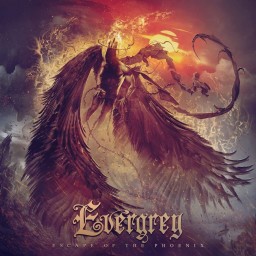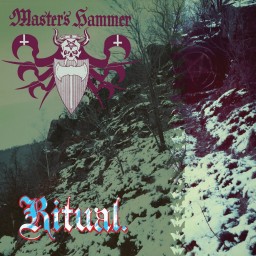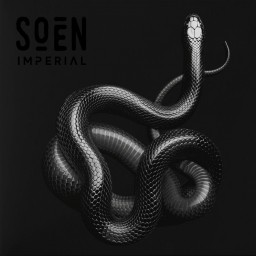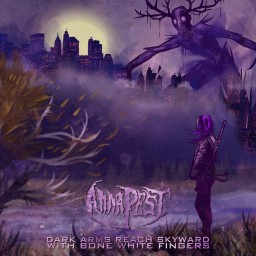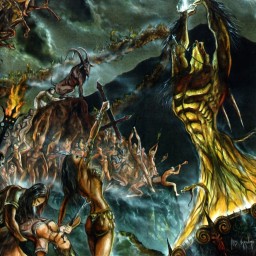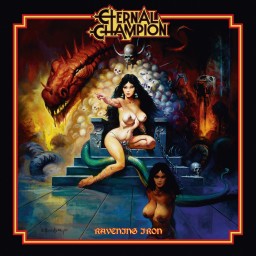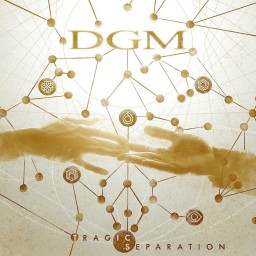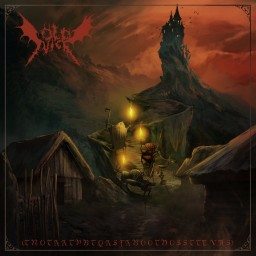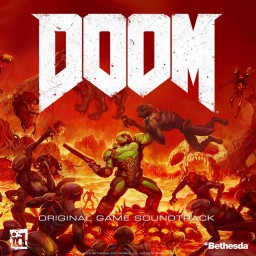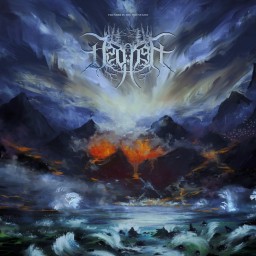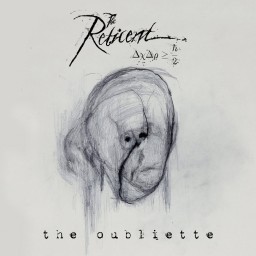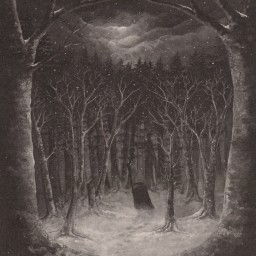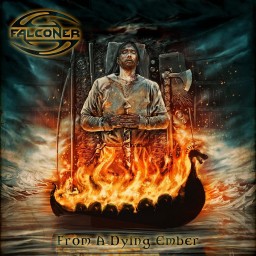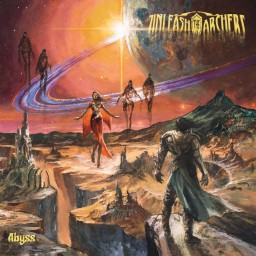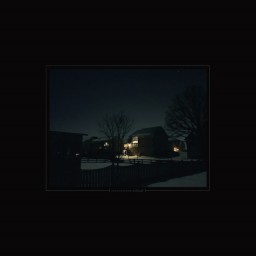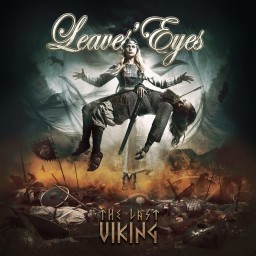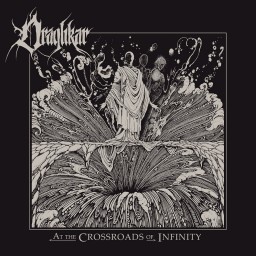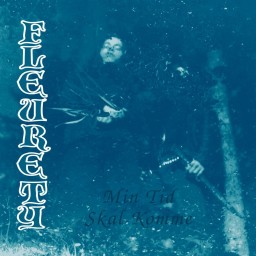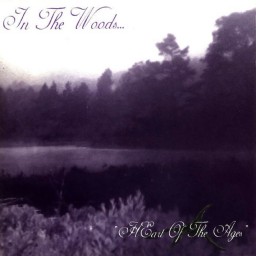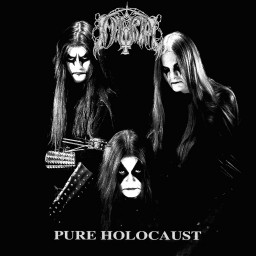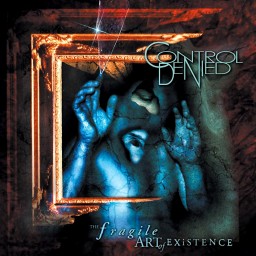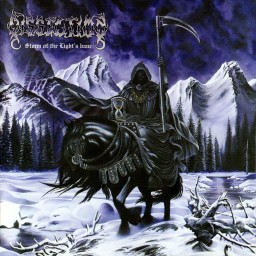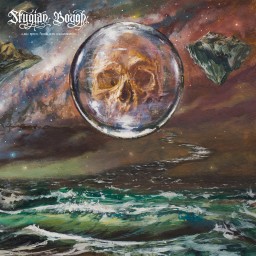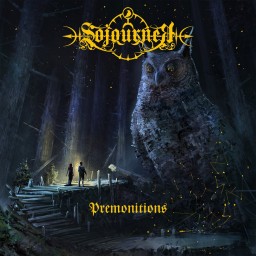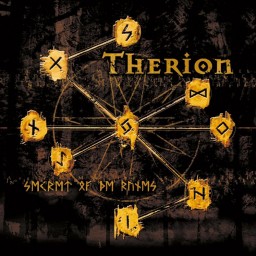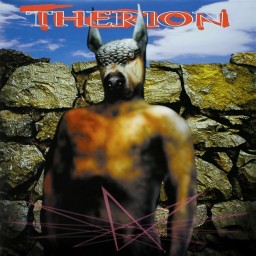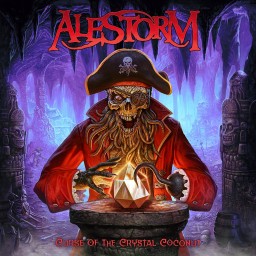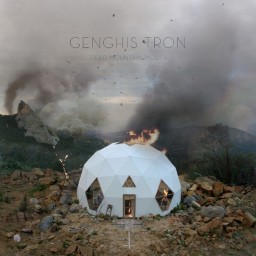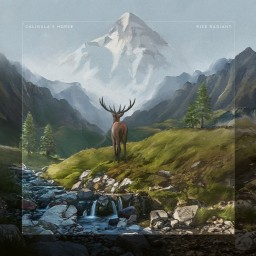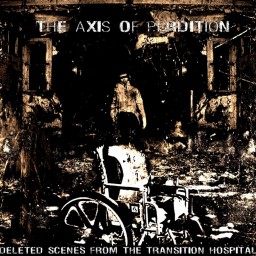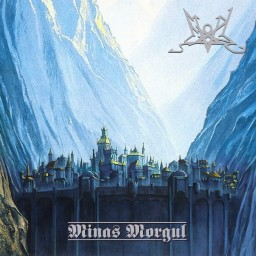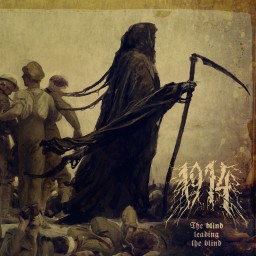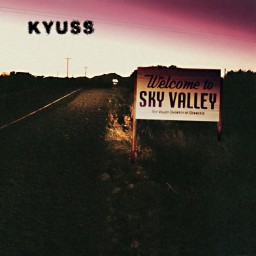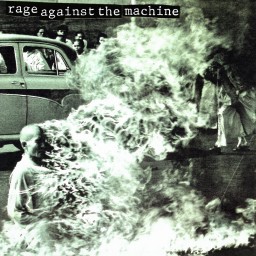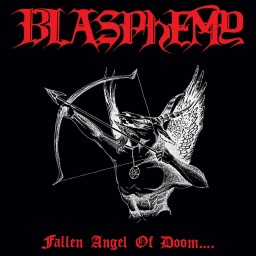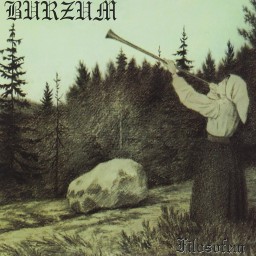Xephyr's Reviews
Covered In Ash
For what it’s worth, I’m admittedly a fan of the new style Evergrey has broken into, starting with 2014’s Hymns for the Broken and, according to them, culminating with 2019’s The Atlantic. Slowly but surely Tom Englund’s riffs have been tuned lower and lower, to the point where I’d consider the tone and chug structures to almost be full blown Djent, but they’ve hung onto enough of their other keyboard and vocal performance aspects to become quite a unique group nowadays. Although there isn’t much progressiveness left in their sound, they’ve successfully carved their own little notch in a more anthemic, drop-tuned chug riff style that I think suits them rather well. I really enjoyed my time with The Atlantic so I figured that Escape of the Phoenix would be another solid album, given Evergrey’s relative consistency, but they may have repeated themselves a bit too much here.
I feel as though I was fortunate to skip over most of Evergrey’s 2010’s material, since I wasn’t as burned out by their relatively samey output when I checked out The Atlantic. Coming into Escape of the Phoenix with any sort of expectations kind of ruined it though, because this album is very much a direct continuation of their previous album without too much else going for it. Englund’s riffs and vocal melodies are as strong as ever, if not also predictable as ever. Even though it’s hard for me to hate their base sound, Escape of the Phoenix doesn’t have the same album progression that has gripped me on some of their previous releases. The riffs and choruses of “Where August Mourn”, “A Dandelion Cipher”, “Eternal Nocturnal”, "Escape of the Phoenix", and “Leaden Saints” stand out so much more than the rest of the album, while “Forever Outsider”, “Stories”, “In the Absence of Sun”, and “Run” fade into the background as mostly filler tracks. “You from You” works as the standout ballad and guitar solo and “The Beholder” surprised me immensely with a James LaBrie feature that actually sounds fantastic as both vocalists harmonize incredibly well with one another. If there's one win that I can take away from this album, it's that it gave me some modern day material that I can say LaBrie sounds fantastic in.
Escape of the Phoenix is very much a mixed bag, with the great tracks making the others completely obsolete in comparison. That being said, having 6 great tracks and 5 completely mediocre ones comes out to be a net positive in the end, so I can't be too upset. Evergrey had much better album flow than this in the past, with the nautical themes and stories of The Atlantic grabbing my attention much more than the same old musings about someone carving their own path through this treacherous world. Fans of Evergrey’s sound will definitely be satiated by all the catchy choruses and effective drop-tuned riffing, but Escape of the Phoenix left me feeling a bit empty. Englund’s admittedly great vocals can only write so many similar anthemic choruses until the charm starts to wear off, so I suppose I’ll have to see where Evergrey stands for me in a few years from now with their next one, because this one has already started to chip away at my patience.
Genres: Progressive Metal
Format: Album
Year: 2021
The Awkward Stage
As I've been continuing to parse through my classic Black Metal homework, the stretch between Bathory's Blood Fire Death (1988) and the explosion of Black Metal starting around 1994 has become more and more strange to me. While I find I consistently enjoy the heavily Thrash-adjacent material of the late 80's and the more modern style of Black Metal of the mid-90's, this experimental phase that groups like Master's Hammer were a part of seems to rub me the wrong way. Albums that are right smack in the middle of an evolution between multiple influences have frequently won me over in big ways, but it seems like the initial evolution of Black Metal misses that mark for me. Even though Ritual has a ton of interesting and unique sounds and ideas, I can't help but think the whole thing comes across as awkward no matter how many chances I give it.
Ritual's defining aspect is easily the vocals, as they're some of the most inhuman and chilling wails I've heard. While I can appreciate some seriously raw Black Metal, the novelty of Štorm's performance wears pretty thin by the time I get to "Jáma pekel" despite the impressive effects he's able to achieve on "Každý z nás...!". Considering how ghoulish his vocals sounds its incredible how Master's Hammer is able to compose any sort of instrumental melody around him, but they manage to do so with varying results. Ritual is an early Black Metal medley that hints at ideas that would become staples for the genre in the years to come, but miss the mark here. "Géniové..." is the most obvious with the creepy, atmospheric choir and slower melodic riffs giving the whole thing a more gothic and theatrical feel even though Master's Hammer stumbles through the strange syncopated rhythms that don't exactly pan out.
The rest of Ritual falls somewhere in-between the experimental "Géniové..." and the blast-beat ridden "Jáma pekel", with the self-titled track "Ritual" being a pretty solid instrumental addition. I can't complain at all about the riffs since each track has a nice balance of chaotic versus melodic passages that keep the transitions fresh and interesting. The solos are also quite good, with "Černá svatozář" having a very notable one. They sometimes bite off more than they can chew with some of the more precise interactions between the riffs, drumming, and vocal melodies though, leading to something that sounds admittedly evil and unchained but a bit clumsy in places.
I can absolutely appreciate what these guys were going for at the time and it's exciting to hear the beginning of theatrical elements like a more expansive background choir and classical instruments like the occasional timpani. These small but meaningful additions really help to move Ritual away from the fiery and thrashy lo-fi beginnings of Black Metal into a slightly more refined product that is still suitably chaotic. Even though I listened to Ritual enough to come around to hearing the interesting genre progressions it offers, I still can't shake the feeling that it comes across as just plain awkward as a whole. The vocals have some impressive shock factor but really grate against the rest of the production, especially on tracks like "Géniové...". Even though Master's Hammer were able to further the Black Metal sound in their own individual fashion, the middle ground they created lacks the experience of later Black Metal but doesn't have the same unbridled aggression of genre's origins.
Genres: Black Metal
Format: Album
Year: 1991
Settling In
Ever since I first heard Lykaia a few years ago, Soen have been one of my personal favorite bands in the more accessible realm of Progressive / Alternative Metal, with their obvious hybridization of Opeth and Tool tendencies not bothering me whatsoever. Obviously ex-Opeth drummer Martin Lopez had a lot to do with this, but I still thought they brought something new and exciting with their instrumental formula and powerful vocalist. While Imperial is very much more of the same, it shows an important continuation from their 2019 album Lotus with Soen fully settling into their preferred sound style. I've personally been waiting for these guys to find their own niche ever since I first heard them, so I thought that Imperial would be incredibly exciting for me, but the direction that they decided to press on in left me a bit disappointed.
Imperial starts out incredibly strong and had me very excited since "Lumerian" is exactly the kind of material I want out of Soen. An amazing opening riff followed by some solid transitions with punchy double-kicks and a more aggressive than usual vocal performance from Joel Eckelöf, with someone even adding some harshes in the background for a great effect before a nice chug riff. If this was only the first song I couldn't wait for what else Soen had in store given the newfound clarity in their direction. Sadly after the by-the-numbers "Deceiver" and the strong single "Monarch" they don't offer much that comes close to the opener. The mix becomes very modern Alternative Metal-like, with the drums having less punch as they fade back into the guitars to create a pretty boring and uniform sound that takes way too much of a backseat for my tastes. While I think it works wonderfully on "Monarch", it leaves much to be desired from other songs like "Antagonist" and "Modesty", with "Modesty" being especially rough around the edges.
The slightly lifeless instrumentals during verses and choruses means that Eckelöf is thrust into the spotlight for most of the album and while he does a great job with his powerful and slightly somber tone, the writing and repetitiveness of his lines wears thin after a while. He definitely pours his soul into it as Imperial might be his most varied performance to date, but the album leans on him way too much for my liking, even though I really like his performances on "Lumerian" and "Monarch". "Illusion" and "Fortune", the slower ballads of the album, don't hold up in any capacity for me, as much as Eckelöf tries. "Illusion" especially sounds like a B-Side rehash of tracks like "Lotus" or the slow parts of "God's Acre" from Lykaia. They add in some strings here and there to decent effect, so that's one progression of their sound that I'm looking forward to in the future, especially since Soen as a whole has been moving in a less heavy and aggressive direction.
It's hard to be upset at Imperial though, since it's far from being a bad record and Soen have been giving fans what they expect for 3 straight albums now. All the riffs are still great, even though they lose some spice during the vocal verses and choruses. It's becoming apparent that every Soen song is just a slight permutation of another one, and while it works for me because I like their overall sound, it's starting to wear a bit thin since by moving away from the more progressive and complex tendencies they had on their previous albums the formula becomes less engaging. "Monarch" is the highlight for what Soen's new style can do with its anthemic feel while retaining slightly more complex songwriting and heavy hitting riffs, even though I prefer the "Lumerian" style. In the end Imperial is another solid offering that will undoubtedly appeal to a wide audience thanks to its accessibility, but it's beginning to alienate the listeners who loved the more progressive side of Soen's earlier material.
Genres: Progressive Metal
Format: Album
Year: 2021
Absurdist Reality
I don’t often find myself returning to this breed of grindy Technical Death Metal after what’s normally an interesting but swift perusal, but it looks like 2021 is already full of surprises. One-person Black Metal productions are something I’m all too used to, but I can’t say I’ve heard of too many singular-member Tech Death projects. That alone is pretty impressive to me since most of Dark Arms Reach Skyward With Bone White Fingers is relentless Tech Death with furious drumming and an array of different styles of harsh vocals throughout. Normally this sort of style rolls right off of me; I’ve found I prefer the thrashier side of Technical Extreme Metal rather than the grindier Deathcore side, but Anna Pest is able to bring a certain brand of likeable absurdity to an already admittedly absurd meshing of extreme metal genres.
Due to my general distaste towards the exorbitantly heavy realms of extreme metal where melodies and song progressions are afterthoughts, there’s plenty of sections that make my eyes roll a bit. The more brutal Death Metal inspired vocals in “If You’re Going to Do It, Do It Now” and the short stretch of songs towards the end, consisting of “Reaping the Flesh of Zeruel” to “Love is Destructive” are definitely not my thing, but Anna Pest never exactly goes over the edge in terms of brutality, with these sections coming and going extremely quickly thanks to the shorter song lengths. Instead, they sit right on a strange edge between blistering, unpredictably intense riffing and curious, melodically technical parts that have much more to them than just heavy chugging. That being said, the constant swapping between these ideas lead to some of the most absurd sections I’ve heard in a while.
While Anna Pest dips into insanely heavy riffing in tracks like “Despoiled by the Light of God” and “Thundering Angel”, I can’t say that these sorts of riffs do much for me overall. “Swordmaiden”, however, is a different story. It has a slightly more Deathcore styled edge and the fleeting but absolutely massive breakdown chug riff halfway through the track always makes me crack a smile every single time I hear it. It’s so down-tuned, so heavy, and so absurdly ridiculous that I can’t help but love it. These small but noticeable moments are peppered in throughout Dark Arms Reach Skyward… and help to give the album a unique and noticeable identity, especially on the whiplash-inducing “Skyward” and the 11-minute closer. The clean vocals and complete tonal shift of “Skyward” come utterly out of nowhere after 9 minutes of aggressive Tech Death and remind me of some sort of anime closing theme, for better or worse. It makes some sort of sense since this album seems to be influenced by anime in some way, considering the art for "Swordmaiden" is what I presume to be some nods to Evangelion after doing a bit of research. The clean vocals and even a sax make an appearance in the back half of “Of the Black Moon and the Red Earth”, which adds an atmospheric and laid back layer to the many other styles on this album.
Dark Arms Reach Skyward… is an interesting case for me, since it’s varied enough that it keeps my interest but still has plenty of sections that I can’t really condone. There’s a great dynamic between the chopped up, short tracks that flow seamlessly from one to the next and the 11-minute epic that relies on actual song progression rather than jumping from one idea to the next. It really does help pull the album’s scattered concepts into a cohesive finale, although I’m still not sure why “How Disgusting” was tacked on at the end. Some of the spoken word sections and vocal effects and styles come off as unnecessary, but I was never a huge fan of vomiting, guttural growls to begin with. All that being said, I do think this album has a ton of creativity and leans into the absurdity of its variety in a really fun way. The riffs and transitions are solid, there’s a huge assortment of harsh vocal styles for extreme metal fans to dig their teeth into, and while the Tech Deathgrind chug can get to be a bit much at times, the end of the album pulls it all together better than I anticipated.
Genres: Death Metal Grindcore Metalcore
Format: Album
Year: 2021
Sinister Shifts
Opus Nocturne is a ripping but unexpectedly controlled and slightly atmospheric album from second wave Swedish Black Metal band Marduk that left me with some mixed feelings at the end of it all. As a band who eased themselves into Black Metal through their previous two records Dark Endless and Those of the Unlight, they decided to fully unleash the aggression and grime on this one, pushing new drummer Fredrik Andersson to the absolute edge and forgoing a more balanced old school mix for one that has less pronounced guitars but a more sinister and epic feel. Even though Opus Nocturne tries to balance itself out with chuggier, more plodding tracks like "Materialized in Stone", the appeal inevitably comes from the unrelenting torrents of blast beats and classic Black Metal chord progressions that sometimes feel a bit too watered down for their own good. So even though the slower and more atmospheric sections are few and far between, they make up most of the highlights for me on Opus Nocturne thanks to incredibly well written transitions and slower, chunky riffing.
Marduk does manage to forge a connection between cleaner, slower parts and raging tremolo riffing that feels much more natural than other epic Black Metal albums at the time, with the transitions in "Sulphur Souls" and "Untrodden Paths" being brilliant and satisfying. Even though some of their repeating riffs put me to sleep after a while, especially since most of the rhythms and melodies felt recycled towards the end of the record. Andersson's drumming tends to accent the same sort of rhythm throughout Opus Nocturne's entirety, so it's not too surprising that the whole affair starts to blend together by the time I reach "The Sun Has Failed". All of that considered, though, I came around to the pernicious wickedness that this album tries to convey, with vocalist Jaokim Af Gravf giving a harrowing performance that refuses to ease up for any amount of time.
The monotony of this album really wore me down, with big, epic build-ups and crescendos ending in the same old riff over and over again. Marduk certainly know how to structure their songs in interesting ways that keeps the evil atmosphere intact, but I was never wowed by any of the riffs themselves. Most of them are only one bar in length and while there's enough variance and subtle progressions as each song goes along, I can't help but go numb to it all after a while. The drumming also doesn't help this case, as impressive and well-placed as it is. I actually really like how all the percussion is tonally placed, with the bass drum sounding solid and slightly cutting through the rest of the mix without letting the blast beats not completely take over each track. Even still, Andersson's relentless performance alongside the sometimes elementary riffing wore me down to a point where I somewhat dreaded every transition back into aggressive Black Metal riffing. It's a shame because he has a hell of a performance on this album, with every crash cymbal being expertly placed and his fills to transition out of slower sections being incredibly addicting.
Opus Nocturne may be considered a forgotten gem in the midst of 90's Black Metal revival, but it's not necessarily a forgone classic for me. Marduk has some great ideas and a killer, classic feel, but they fall a bit flat on staying interesting through the entire runtime of the album. I'm sure that diehard fans of the classic Black Metal sound will be returning to this release as Marduk's standout alongside Those of the Unlight, but it doesn't leave me with many standout impressions compared to other Black Metal releases at the time. Still a welcome and sinister addition to multitude of fantastic and relentlessly aggressive classic Black Metal albums.
Genres: Black Metal
Format: Album
Year: 1994
Evolving Barbarism
Power Metal was suspiciously absent during most of 2020, with almost no big or upcoming names dropping any sort of outstanding albums. Falconer and DGM had albums that thoroughly impressed me, but I'd consider their styles to be Power Metal adjacent instead of what you'd come to expect from the genre. So as the year wound down, I stumble upon a rather suggestive US Power Metal sophomore offering from Texas' Eternal Champion, a band that showed they are determined to keep 80's Power Metal alive and kicking. From the punchy, gallant galloping riffs to the uniquely controlled vocal performance, and not to forget the well-oiled abs of the cover art, their 2016 debut The Armor of Ire showed immense promise and gave classic Power Metal fans something to sink their teeth into since it was so traditional. While The Armor of Ire is a good album in its own right, 80's Power Metal worship isn't exactly my preferred kind of classic metal, so I was pleased to hear that Ravening Iron wasn't just a repeat of their debut, but a full on evolution of their sound into something that fits my tastes much, much better.
Much of that taste is centered around riffs, and Ravening Iron delivers more than anyone could ask for. A few tracks like "War at the Edge of the End" and "Worms of the Earth" reproduce some of the more classic, galloping triplets that were so prevalent in their previous album, but the rest of the album is just one killer riff after another. Eternal Champion lean into a fuller, louder, and more vigorous production style that really helps to drive home the amazing riff writing in this album. Gone are the faster paced gallops, replaced with chunky, mid-tempo chug riffs that have more extended melodies than the usual Power Metal fare. "A Face in the Glare" immediately gives the listener a taste of the kind of riff style you'll expect throughout the album alongside driving drums and a very warm and rich bass foundation. As I'm sure most metal fans know, there's some sort of intrinsic instinct that lets any listener know how hard a riff goes, even though they couldn't begin to explain the music theory behind why one riff hits harder than another. I sometimes wish I took more music theory to mathematically deduce what makes some riffs rock harder than others, but on the other hand there's something pure about being a fan of music and hearing something that you just know goes extremely hard. For me, I instantly got that feeling on almost every riff in this album, whether it was the scratchy "Ravening Iron", the chug of "Skullseeker", or the epic downtempo "Coward's Keep". This album hits me just right when it comes to chuggy Power Metal riffing thanks to the cleaner and more pushed forward mixing.
Eternal Champion stands out in more than just riffing though, with a unique vocal performance that treads a line between spoken shouts and epic Power Metal delivery that I haven’t really heard before. Jason Tarpey’s higher pitched but rock-solid vocal timbre at first sounds extremely unenthused and not the greatest for something like Power Metal, but as the album progresses it becomes clear that the band knows how to use his vocal style to amazing effect. Even though his delivery can seem lackadaisical during certain sections like the chorus of “Ravening Iron” and portions of “Worms of the Earth”, there’s something about how the reverbed vocal lines work together with the riffs that elevate them away from simple spoken word territory. Once I got more acquainted with the album it became clearer how much personality Tarpey is able to put into his voice, especially with the background screams and flourishes that are hidden behind the riffs. I think Eternal Champion’s formula and vocal choices are some of the best that I’ve heard out of US Power Metal, fitting the more gritty and barbaric fantasy that the subgenre tends to focus on. That classic, more “realistic” fantasy atmosphere is well conveyed too, with small synth flourishes and more dramatic moments like the beginning and end of “Coward’s Keep” thrown in there.
Since I’m not the biggest fan of classic US Power Metal, Ravening Iron impressed me so much more than The Armor of Ire thanks to its chuggy tendencies, improved songwriting, and better album structure. Ravening Iron has the perfect mix of quick, galloping riffs to offset the relentless chug and does a better job placing its instrumental break, with “The Godblade” being a neat atmospheric intro to “Banners of Arhai”. As someone who has always preferred the European style of Power Metal for many, many years, Eternal Champion have managed to win me over with their more classic and down to earth approach. The replay value on this record has been insane, with the progressions and payoffs of each riff never getting old since everything is so well written. Even the solos are concise but memorable and exciting. If anything, Ravening Iron is a bit too short coming in at only 7 tracks and 1 interlude, but at the same time having a filler track or two may have ruined the experience. I can’t imagine what their third album is going to be like if they continue to improve their craft, since I’m going to be returning to Ravening Iron anytime I need my classic Power Metal riff fix.
Genres: Heavy Metal
Format: Album
Year: 2020
Boundless Spirit
DGM is a band that's been having quite the run over the past 15 years after a pretty rocky history. Although the band is named after the three founding members (Diego, Gianfranco, and Maurizio), it turns out none of them are a part of the group anymore, with Maurizio Pariotti being the last to leave in 2003. I always found it strange how the DGM name continued to live on through the initial exodus, but the band has been tightly knit since, sporting the same lineup since their 2009 release Frame. Although they're far from a household name in Progressive Metal, their consistently solid output since Frame caught my attention and they eventually made me into a fan with their 2016 album The Passage. It goes to show that having a consistent lineup can really do wonders for a band's output, considering DGM's 1990's and early 2000's material was considerably rough. Tragic Separation shows that the band wasn't done with what they started in The Passage, with it mostly being a direct continuation of similar sounds and ideas from 4 years ago.
Even though I'd consider DGM to be a Progressive Metal act, their last two albums have shown them opting for an energetic, Power Metal-esque backdrop to all of their technical playing. Even though the tracks have more extended song structures and more complex riffing than your average Power Metal fare, their music stays grounded enough to not feel randomly disjointed. This straightforward approach works wonders for someone like me who, even though I enjoy a great deal of Progressive Metal, got tired of the tangential and aimless transitions that can plague the genre. Tragic Separation gets straight to the point with fast and precise riffing, great vocals and hooks, and impressive features from the band as a whole. They've really perfected The Passage's style on this one, making each song sound so aggressive in a lively way rather than a dark way. It was seriously apparent how much better their songwriting has gotten after I went back to The Passage after enjoying this album so much. Even though I still really enjoy their previous release, it's obvious how much more comfortable they are in Tragic Separation as the song lengths are more drawn out without losing any amount of energy or spice.
In many ways DGM fill a niche of Progressive Metal that has been getting lost over the years with bands like Symphony X and modern Fates Warning slowing down in recent years or losing some of their quality. Full steam ahead songwriting without any of the progressive fluff is something that I keep coming back to about this band, but it can't be overstated how well I think it works for them. Vocalist Mark Basile is able to belt out some seriously catchy melodies that keep up with the rest of the intricate playing but never overshadows what's going on in the background. While the instruments have some heft to their tone, everything feels light, precise, and feel-good, which is pretty unique for this kind of style. The solos are well performed too, being impressive but never drag on for too long. The shorter orchestral interludes like in the beginning of "Tragic Separation" are a welcome addition to add some much needed variety and sound great, fitting right in place with the overall feel of the album.
As much as I enjoyed this album, I have to admit that that you really have to like DGM's style to get the most out of Tragic Separation. In many ways the album is ten renditions of the same track, with their formula not deviating all too much. That being said, I dig their formula so this time around that it didn't matter much for me, but I can see it being a bit of a slog if this isn't the exact style that you're looking for. DGM are a talented group of musicians that struck gold with their repetitive ideas this time around, with great riff after great riff and a multitude of catchy choruses to choose from, but if you're looking for something challenging or overly complex, you'll probably have to look elsewhere. For me, though, Tragic Separation is an insanely fun album with its free-wheeling melodies and never-ending energy.
Genres: Progressive Metal
Format: Album
Year: 2020
Old Nick - The Night of the Ambush and the Pillage by the Queen Ann Styl'd Furniture, Animated by One of the Dozen or So Spells That Thee Eastern Vampyre Has Studied (2020)
The Penmanship of Permanence, Scrawled With the Colour of Imperialist Rome Within Thee 97rd Page of Melodious Splendour
I wasn't really sure what to think when I saw this album title flash by as I scrolled through the pages and pages of Metal albums I had missed this year. One thing was for certain; I just had to listen to it. Much to my surprise, this might be one of the most charming Black Metal releases to come out of 2020. With a name like The Night of the Ambush and the Pillage by the Queen Ann Styl'd Furniture, Animated by One of the Dozen or So Spells That Thee Eastern Vampyre Has Studied I wasn't expecting too serious of a project from the mysterious Old Nick, and while I was right to assume that, I can't lie and say this isn't some genuine lo-fi Black Metal. Old Nick have come out of nowhere in 2020, releasing a ton of demos and EP's starting in the spring of 2020 and eventually releasing their first full album Forest of Grief at the end of April. Forest of Grief sets up many of the elements shown on this release, but the feel and production is completely different, with the latter going for an extremely pushed back lo-fi Black Metal experience with some killer riffs and cool dungeon synth integration. While I enjoyed Forest of Grief their second album, released about 6 months later is...something else entirely.
The Night of the Ambush... is inconsiderately loud in comparison to Forest of Grief and much, much stranger. Old Nick's first album planted itself firmly within normal lo-fi Black Metal worship, but this album bursts out of its confines and runs completely wild. Honestly, I sometimes don't even know what's happening in some of these tracks. And that's what makes it pretty fantastic. The Dungeon Synth element is extremely pronounced in this one compared to Forest of Grief, creating a bizarre but sinister Victorian-era impression that I can't say I've heard before. It creates such a demented contrast since most of these effects are happy and triumphant sounding. All kinds of different distorted synths, strings, what I can only imagine is some kind of harpsichord, and an assortment of other noises that I can't even discern come out of nowhere to push their own melodies on top of the ripping Black Metal riffs behind them. The riffing is satisfyingly low quality and aggressive and, somehow, it feels right at home beside all the crazy effects happening all around it. The drums carry on the standard Black Metal blast beat but never overdo it, helping to somehow keep everything grounded. The riff writing is also pretty fantastic, even if it may be a bit simple. These are some of the grimmest and most blistering lo-fi Black Metal riffs I've heard in quite some time, even when they're being played behind whatever strange waltz of instruments decides to pop up. The vocals also sit successfully right in the middle of the mix, filling in any possible empty spaces with reverbed howls that sound suitably painful.
It's just incredible how flat out strange this album is. One moment there's an intense Black Metal riff taking over the stage, the next moment a marching band passes through while the vocalist is still howling away in the background. The whole album is just an unhinged mess of insane things happening in some sort of sequence that eventually just ends, leaving the listener in the dust trying to make heads or tails of what just happened. After the initial shock wore off, I came back to this album impressed with how well this idea was executed compared to Forest of Grief, with this album having way more variety in a more concise but crazy package. It also makes me happy that bands are still trying to work within the Dungeon Synth angle of Black Metal because, for some reason, it works incredibly well when done right. Old Nick have burst into the scene with an incredible amount of lo-fi content that feels astonishingly fresh given its inherently dated nature. Plus, it's just a hell of a lot of fun.
Genres: Black Metal
Format: Album
Year: 2020
Rips (But Does Not Tear)
Videogame Original Sound Tracks (OST's) have always been a sticking point for me for multiple reasons, the paramount one being OST's are meant to be experienced alongside the act of playing the game that it accompanies. When you create music or sounds for a game it can't overpower what your character or the enemies are doing, since that would lead to confusing and frustrating gameplay. Trying to rate and talk about one of the most revered and ripping modern OST's feels incomplete without controlling the Doom Slayer himself, but despite being two hours long Mick Gordon's collection of 31 tracks with a few excerpts from codec entries holds up rather well by itself. Just to be clear, the 4.5 out of 5 rating refers to this OST as part of the DOOM 2016 package, which is no doubt phenomenal, but this review will look at the music as if the game never existed, which is a tough sell but it's something I wanted to try.
At it's core the DOOM OST has two different styles, a Djent-y heavy metal style and a dark industrial electronic style. Fitting, since DOOM definitely only has two speeds, maiming demons or walking to the next area where you're maiming demons. The Djent-Industrial Metal is heavy and well done, with the chugging rhythms taking the spotlight rather than notes or melodies. "Rip & Tear", "BFG Division", and "SkullHacker" pound into your head with the brutal aggressiveness that DOOM is known for with down-tuned guitar, blasting bass drum, and white noise cymbals. The cymbal sound effects are especially interesting because the the constant white noise during the chug riffs make the silence in-between other riffs way more impactful, giving certain sections that weighted heaviness that DOOM requires. The syncopation of the riffs is also an extremely important concept that Gordon is able to nail, with the second half of "Rust, Dust and Guts" exemplifying this. The album as a whole is obviously very loud and in your face, but does a great job of volume control and is mixed very well so that everything is audible even in the loudest of sections in "BFG Division" and "Mastermind". Since a lot of the sounds are heavily doctored by Gordon in post the drums and guitar have the exact amount of impact they need, with the drums especially having just the right amount of echo and sustain to keep the chug riffs driving. The atmospheric sections are a blend of story-driven monologues behind sweeping synths or long, drawn out orchestral sections. These atmospheric sections serve as the calm before the storm and are surprisingly varied in their use of unique sound effects to keep it somewhat interesting. Most of the time, though, these tracks serve as a waiting room until the next heavy, riff based track hits.
In terms of video game OST's DOOM is easily one of the most cohesive and tailored to the experience that DOOM provides, but as a 2 hour album experience it's just too much. After multiple listens many of the tracks are throwaways, especially the more atmospheric ones. "Rip & Tear" serves as the first and best looks at the industrial heaviness of DOOM, but it does such a good job of cramming everything the rest of the album is going to do into one 4 minute track that everything proceeding it sounds a bit redundant. For the heavy tracks; "Rip & Tear", "BFG Division", "Cyberdemon", "Skullhacker", and "Mastermind" will give you everything you could want out of this album, with the rest being quite redundant or drawn out. "Hellwalker", "Transistor Fist", "Vega Core", and "Flesh & Metal" don't hold up comparatively with their more electronic-focused and less groove-based riffs. Between these highlights are the atmospheric sections, which get really old really fast considering there are so many of them. Even though I knew that DOOM takes place on Mars and in Hell and is all about fighting off the demon horde, I can't say I ever got "Hell" or "Demons" from the feel of all these atmospheric tracks. Most of the time I was thinking "Space" or "Extraterrestrial", which is absolutely part of the game but not necessarily what DOOM's focus is, which is ripping demons in half. The monologues of "Dogma", "Demigod", "Dakhma", and "Doom" help to reorient the mental picture a bit and are great uses of the game's lore to provide some background as to what the OST is trying to portray, but they are few and far between on this 2 hour excursion. I would have preferred either a few more of them or the existing ones to be chopped up into smaller sections so they could pop up more often throughout the album to help keep the listener engaged and help to tell the story.
Overall, Mick Gordon's DOOM OST is just filled with too much DOOM. While viciously aggressive and industrially heavy it turns out to be too much of a good thing, with certain tracks feeling redundant and dragging on for too long with repetitive ideas. Each slow buildup into another chugging, almost one-note riff feels the same, each slow atmospheric calm feels the same, and after becoming familiar with all 2 hours of the OST there are so many tracks that just aren't needed. Even the closer, "Mastermind", is kind of outclassed by "Rip & Tear" and "SkullHacker" with its use of actual game sounds of the assault rifle. Not the best way to end an album of this length if one of the first songs is better than the very last one. If this OST had released with a few less atmospheric songs, maybe shortened some of the longer more repetitive tracks, and had taken out some of the less necessary portions, it maybe would have been a bit more bearable at a 1 hour length. As I said before, the 4.5 out of 5 is for DOOM being one of the most complete and immersive OST's that really feels tailored exactly to the game's experience. But as a standalone product it's extremely redundant and long-winded, and the two well executed styles of dark atmospheric electronic and industrial metal start to lose a bit of their sheen after the hour mark of this demon murdering symphony.
Genres: Industrial Metal
Format: Album
Year: 2016
Beauty Through Redemption
Thunder in the Mountains was one of the first albums that made it onto my 2020 listening rotation when it released almost a year ago now, much to my surprise. I had randomly stumbled upon Dzö-nga a few years ago, hearing their 2017 album The Sachem's Tales and feeling extremely unimpressed. Their new offering is like night and day though, taking the faint ideas that I can barely remember from The Sachem's Tales and creating a compelling and gorgeous set of songs that exist in a unique middle ground between being folky but atmospheric. While there are atmospheric ideas and choices present throughout the album, like during the female-fronted verses and instrumental sections of "The Death of Minnehaha" and "The Song of Hiawatha", the album on the whole is still very riff, melody, and chorus focused. Even though all the elements of Thunder in the Mountains seem to point to the expectation of the listener getting lost in a folky, Native American themed landscape, that's not exactly what it accomplishes, and I think that's part of the charm.
With Atmospheric Black Metal and a lot of Folk Metal being dominated by a few select styles from a few select regions of the world, it's been a breath of fresh air to hear different styles of sound and instrument choice surfacing a bit more in 2020. With Kataayra's two 2020 albums showcasing a more temperate, muggy atmosphere with tribal influences, Dzö-nga follows suit with a less cold and despair-ridden sound in favor of a warm, inviting, but still heavy sound that utilizes a ton of plucky acoustic guitars, smooth strings, and high pitched flutes. The flutes and the occasional piano carry the brunt of the melodies during the instrumental sections, showcased instantly during the chorus of the opener "The Song of Hiawatha". Even though the guitar and drums are more often than not playing rather generic Black Metal background fare, there's still a plethora of great riffs and solos that come and go as the songs progress. The pinnacle riff towards the middle of "The Death Of Minnehaha" is a fantastic and memorable way to close out the album, showing that this album has more tricks up its sleeve than just pure atmosphere. I found the songwriting and overall flow of the longer tracks to be great as well, with "The Death Of Minnehaha" pulling a clever reprise of the original acoustic riff that was used on "The Song Of Hiawatha". The way each of these longer songs progress is incredibly satisfying to me, bouncing between airy female and harsh male vocals as well as Folk-carried atmospheric sections and hard-hitting Metal sections.
The middle of the album is much more forgettable than the two bookends, unfortunately. "Heart Of Coal" reuses the same elements in a slightly more condensed package and has an interesting instrumental ending but just feels less potent than the rest of the album. "Flames in the Sky" and "A Soul To Burn" are remarkably chorus-focused, being borderline catchy with noteworthy melodies from the vocals and the flutes or violins after the choruses. "Starlight, Moonlight, Firelight" mostly serves as an intro to "The Death Of Minnehaha" but I still really enjoyed seeing how pretty Dzö-nga can make their formula. Thunder in the Mountains just hits that sweet spot of catchy folk instrumentation with well written percussion and background riffs that occasionally hit extremely hard. The vocals hold it back though, with the harsh vocals sounding a bit tight and out of place, and the female vocals sounding a little one-note and possibly even too relaxed at times. Some of the more generic sections go on for a bit too long too, especially in the middle portion of the album, with "Heart Of Coal" and "Flames in the Sky" just existing for the most part.
Faults aside, Thunder in the Mountains is a unique take on a folky and slightly atmospheric Black Metal album that centers loosely around Native American culture. I think that warmer sounding Black Metal has its place in the genre moving forward and even though I'm sure that there have been other bands with this style before 2020 (Saor being one of them), it was neat to discover multiple groups this year pushing for this kind of sound. The opener and closer are very well written and deserve their extended length and even though the middle falls a bit flat it never stopped me from coming back to it. Plus, it's insane how much of an improvement this album is over their 2017 release that I'm really hoping that Dzö-nga can ride this creative wave and continue to hone and experiment with their sound in the coming years.
Genres: Black Metal
Format: Album
Year: 2020
Let Me Out
The Oubliette may go down in history as my highest regarded album that I don't have the will to listen to ever again. Even as someone who hasn't had to cope with any of their loved ones having dementia or anything like it, this album hit me extremely hard. If anything, that proves just how well The Reticent wrote and performed this concept of following the mental struggles of someone at the edge of their mental stability and overall life. It was a bit odd sounding at first to have the dementia be portrayed through Progressive Metal, with it tending to have a few too many unexpected twists and turns here and there, but after a while the themes really started to fall into place as the album progressed. The Oubliette doesn't shy away from the sheer amount of fear and despair that this condition can cause, leaving one trapped and screaming inside of their own mind, heard horrifically at the end of "Stage 6". So, in many ways, The Reticent were undeniably successful in creating a substantial and worthwhile look into something that a lot of families struggle with. But, in doing so, the experience they crafted doesn't give a lot of room for replay value, especially when you have a vivid imagination like me. I let myself get completely enveloped by the lyrics and story and it got me good; so good that I don't think I have it in me to come back, so take that as you will.
Genres: Progressive Metal
Format: Album
Year: 2020
Unlocking The Blizzard
Although I've learned to relish the blurry realms of Atmospheric Black Metal over the past few years, I can't say that the genre impacted me in the way I've seen from others. From the cold anger of Burzum, to the folk inspired Soar, I've come to appreciate the monotonously discordant but rewarding style of the genre, but deep down I knew I never exactly got the full experience of what some of these albums can offer. Classic Atmospheric Black Metal albums have a knack for transporting listeners to icy, snow covered mountains as the freezing wind rips across the landscape, slowly draining the life and color out of the frigid atmosphere. The grinding, nondescript guitar riffing over pounding drums echoing from miles away as haggard, shrieking vocals pierce through the turbulence has been the tried and true formula since the subgenre's debut in the mid-1990's and, in a lot of ways, it hasn't changed much. Strides have been made to take Atmospheric Black Metal out of the snow covered hills and into other locales, even the farthest reaches of space with acts like Mare Cognitum, but if anyone wants an unadulterated experience of the subgenre, it's hard to stay away from the raw, wintery ambience that artists like Paysage D'Hiver pride themselves on. So, for the first time, an Atmospheric Black Metal album fully transported me to the blizzardy wilderness that it fiercely attempts to convey.
Even though I've been listening to albums like this for a few years now, Paysage D'Hiver had gone completely under my radar, with me forgoing late 1990's and early 2000's releases in favor of the mid 1990's classics and the more modern, 2010's releases. In many ways Wintherr, the man behind Paysage D'Hiver, has been carrying the torch of classic Atmospheric Black Metal by keeping the production quality on the low side and keeping his projects as a one person operation. There's something nostalgic about the way he continues to create this type of Metal in the way he does, even though I wasn't around and listening to this kind of stuff when it was first making waves in the Metal scenes. Although Wintherr has been producing albums that can clock in at over 50 minutes in length for the better part of 20 years now, it's only with the release of Im Wald that he says he's released his first true album. Although I scratched my head at this notion at first considering his self-titled "demo" is very much a full-fledged album in my eyes, I can see where he's coming from, given the structure and production quality for Im Wald is vastly different from the likes of Paysage D'Hiver or Winterkaelte. The absurdly low quality production that these earlier albums had is all but gone in Im Wald, and for some that's a deal breaker considering the history that Atmospheric Black Metal has. For me, I much prefer the more resonant and full sound that Im Wald has, allowing me to become fully engrossed in the cold wall of sound but still able to pick out memorable riffs and parts on every song. It's still not immediately approachable since most of the riffing is extremely similar throughout its gargantuan 2 hour runtime, but the more I listened to this record throughout the year the hidden details began to surface more and more.
It's not entirely wrong to say that this album doesn't cover any new ground whatsoever, with the basis of every long, drawn out track being a flurry of almost indiscernible tremolo picking that carries some sort of chord progression across its entirety. However, Im Wald feels like the most completely Atmospheric Black Metal package I've ever heard, with it transporting me into the cold, dark, snow covered forests right from the beginning. "Im Winterwald" showcases most of this albums' elements wonderfully, with a haunting tremolo chord progression, indiscernible vocals, a strangely satisfying kick and snare drum sound, and a mystifying synth towards the middle of the song. This type of song structure will be repeated throughout the rest of the album but in distinctly different ways, keeping the album consistent and cohesive but not too stagnant. I'd be lying if I didn't think that tracks like "Flug" have a progression that goes on for a bit too long and something like "Kälteschauer" feels a little redundant after an hour and a half of music, but I never really mind when I listen to the album cover to cover. Im Wald was able to grip me so tightly that I began to not really think about how long it was or how repetitive it could be, but to focus on what was happening in the moment and appreciate the satisfyingly sluggish progression of the riffs. "Über den Bäumen" and "Le rêve lucide" have incredible main riffs that hit incredibly hard despite not being very accented in the mix and always have suitable build up for maximum effect. These riffs aren't even the crowning jewel of Paysage D'Hiver's work though, since I found myself incredibly drawn to the extra little effects that he puts into certain songs that turn them into some of the best Atmospheric Black Metal I've ever heard. The transition from "Wurzel" to "Stimmen im Wald" with the male choir is easily one of the best transitions I've heard, and the faint but chilling vocals of "Weiter, immer weiter" to go along with the main riff is stunning. These small but substantial additions to the perfectly executed generic formula that Wintherr creates elevate these songs in a way that I can't really believe.
Among all the chaos and sometimes indistinguishable riffing, Im Wald is blanketed by a layer of atmospheric powder, with most of the intros and outros to the lengthy tracks being a mix of poorly recorded wind, swaying trees, and what I presume to be footsteps through the snow. There are even interludes to showcase these recordings, with "Schneeglitzern", "Wurzel", "Eulengesang", and "Verweilen" serving as short interludes to build atmosphere and to add a bit of ominous synth into the mix to set up the next track. There's a point to be made about these feeling like filler sometimes, but I personally think they serve as adequately spaced breaks in-between the rest of the chilling chaos. While most of the recordings themselves sound extremely similar, I'm assuming to keep the album grounded with a cohesive baseline, the small flourishes each one uses to distinguish themselves is satisfying and keeps the album moving after growing accustomed to how it progresses.
All in all, I think that Im Wald marks the first album that made me truly understand this kind of music on a deeper level than just throwing on Atmospheric Black Metal for some background noise. It challenged me with its seemingly reprehensible runtime and supposed monotony, only to have me wanting even more after two hours of it. I can understand why diehard fans of Atmospheric Black Metal would prefer Wintherr's self-titled release, since that one is so much more raw and really leans into the classic style, but Im Wald is able to bring that classic style into the modern era in a massive way. The riffs are crushing, the atmosphere is frigid and dark, the production is haphazard but rewarding, and it produced some of my favorite moments that I heard in all of 2020. I was finally able to walk through the blizzards in the snow covered forests whenever I decided to embark on the journey of this album this year, and it never disappointed.
Genres: Black Metal
Format: Album
Year: 2020
The Rewarding, Slow Burn
It's almost poetic how From a Dying Ember slowly but surely won me over in the second half of 2020, given the circumstances surrounding it. After nine albums and an assortment of lineup changes, the band members have announced that this will be Falconer's final offering, leaving a solid cult following behind them. I'll admit that I didn't hear of Falconer before checking out this album, especially since their debut self-titled is apparently highly regarded, but after hearing this one I'm definitely going to have to fix that. While this album resides in the realm of Power Metal, they manage to have a folk leaning that is wholly unique to me, with their songwriting and inimitable vocalist impressing me to the point where I couldn't stop coming back for more.
From a Dying Ember honestly doesn't leave a very good first impression, initially sounding fairly generic and forgettable with its somewhat strange song structures and unassuming riffing. I thought it was good at first, but it wasn't until I came back to it for a few more listens that it really started to click with me. The choruses slowly started to settle themselves in my memory more and more, with "Fool's Crusade", "In Regal Attire", and "Testify" becoming tunes that I would hum completely out of the blue. Upon further inspection, this album really does have everything one would want out of a band like Falconer. Mathias Blad's silky smooth, mid-range vocals have so much character and are extremely well written, giving them such a unique flow that winds its way around the rest of the instrumentation. The Folk elements are neatly incorporated without taking over the entire sound, with the fiddles and pianos firmly playing a supportive role to the rest of the composition. Falconer also pull from their earlier, more extreme metal roots in a few tracks, with surprisingly aggressive double-bass in "Desert Dreams" and some quick but noticeable tremolo riffs in "Kings and Queens" and a full-on Black Metal-esque section in "Rapture" as a final farewell to their old band Mithotyn.
It helps that Falconer uses 3/4 and 6/8 for a good portion of tracks, with most of them having a waltz or swing feel to them. This small change really helps their songwriting to be more folky and fantastical without necessarily feeling generic. Although there are some unexpectedly heavy sections, the playful waltz feel really helps to keep the album grounded in the fantastical and folky world that Falconer excel at. Even when they find themselves in a common 4/4 time signature, the guitars or drums keep the folky, swing feel going with melodies that begin with an off-beat 8th note into an accented downbeat, which is something I began to notice more and more as I gave the album more and more listens. There are a myriad of rather hidden and layered melodies that got more and more satisfying as the months have gone on, leaving From a Dying Ember as one of the albums that has grown on me the most in quite a while.
Even though this marks the end of Falconer, I can't imagine a better album for a band in their genre to go out on. There's so much surface-level Power Metal out there, so it was a delight having these songs eventually worm their way into my memory to keep me coming back for more. The balance of heavy riffing, slow ballads, solos, and folk interludes is fantastic as well, with "Garnets and a Gilded Rose" being a great instrumental and "Rejoice the Adorned" beautifully showcasing Blad's sultry vocals. Even without prior knowledge of Falconer I can tell that these guys covered all their bases considering how many different styles there were able to cram into this album. Considering I've only given glowing praise to From a Dying Ember, I still think that it's far from a classic or anything like that, but it's undoubtedly solid through and through. It's a bit repetitive in its ideas but it builds and works around them in intelligent ways, especially with its use of slower tempo vocal and guitar melodies to go along with some strangely furious drumming. Although I have zero history with Falconer, this is a fantastic swan song that exemplifies all of their crowning characteristics as a group in an extremely rewarding collection of songs. Cheers, fellas.
Genres: Power Metal
Format: Album
Year: 2020
The Frustrations Of Potential
Unleash the Archers have been ceaselessly scaling the mountain of improvement since their beginnings in 2009, with album after album slowly but surely being better and cleaner than the last. That all changed once they reached the summit on the aptly named Apex in 2017, delivering one of the best Power Metal performances I've heard that's only gotten better with a bit of age. Apex is so jam packed with energy from every single member of the band for its entire runtime that I knew it was going to be a tough act to follow up on, especially since it catapulted them into a more mainstream spotlight. As I was checking out Abyss I decided to go back and really analyze Apex even more than I had before and, much to my surprise, it was the album that kept on giving. Lyrics normally aren't my strong suit so I had completely missed the awesome story that Apex had laid out leading up to Abyss. Even though this album had almost no chance of topping Apex for me, it's way rougher around the edges than I anticipated.
To get anyone caught up with what Unleash the Archers had created with Apex, here's a short rundown of the story:
The Immortal, the protagonist, is called from his endless slumber to serve an evil woman called The Matriarch to go bring her four sons back so she can sacrifice them and become some sort of all powerful deity. The Immortal must comply and goes to face off against the four brothers, The Immortal not feeling remorse because they each have their own vices. The fourth brother goes willingly and shows The Immortal kindness, which leaves him conflicted. In the end The Matriarch completes the ritual and sends The Immortal back to his mountain prison and basically takes over the world.
This story accompanied by Apex's music made me really hopeful for the success of Abyss, since it's a direct continuation, but alas, it just doesn't measure up for me in the end. I'll get the ending of the story out of the way first, attempting to not sugarcoat it:
The Immortal wakes up hundreds of years later and searches through space for a new purpose until he comes across a familiar man, who is the son of the fourth son who was kind to him in Apex. He swears to set The Immortal free from his slavery if he defeats The Matriarch who rules over the universe, but he is still in servitude to The Matriarch who enters his mind every now and again, so he goes to find her. He fights the ghosts of the four sacrificed brothers in an extremely non-descript way and finally faces off against The Matriarch. He runs away for some reason but finally decides to face his problems and fights The Matriarch, using something called The Spark to vanquish The Matriarch in pretty anticlimactic fashion. The Immortal is then set free and chooses to roam the galaxies as a protector rather than choosing death or servitude.
What made Apex's story so gripping was that it was straight to the point and well defined, each song moving the plot forward at a reasonable pace. There were almost no moments of ambiguous meandering, which created a compelling and easy to follow story once someone paid attention to the lyrics. Abyss fails to keep it simple and falls into some of the same traps as other Power Metal concept albums, with some difficult to follow perspective changes and songs that don't really move the story forward in any meaningful way. There are so many awesome moments that they set up in Apex that just fall flat in Abyss, like the fight with the spirits of the four sacrificed brothers, the final confrontation of The Matriarch, as well as the conflicted morality issues that The Immortal seemed like he would have to face. The overall setting and travelling is also much more confusing, with The Immortal seemingly spending a huge amount of time just travelling the universe in very unclear and anticlimactic ways. While I can deal with almost every Power Metal album having a weak story, the fact that Abyss was supposed to be the gigantic climax to Apex left me wanting much, much more out of it.
The music itself isn't that much more impressive either, with obvious differences in mixing and production showing up right out of the gate in "Abyss". Abyss feels so much flatter with everything feeling more pushed back and less accented in order to make space for the new use of synths. Even Brittney Slayes' performance feels lacking in places, with the songwriting seemingly pulling her back during certain choruses and a few lyrics that stumble on delivery. The harsh vocals from one of their guitarists still fill the role of speaking from The Matriarch's point of view, showing up in four of the ten tracks but still being pretty sparse, leaving me wanting a bit more of them considering this album was about the final fight with her. The addition of the synths was a somewhat necessary evolution in order to try and distinguish and elevate Abyss from Apex, especially considering the space and future setting, but I found myself never really noticing the synth all that much in the end. While it helps to create a different sounding atmosphere, I don't think it necessarily adds much of anything in the end, even in synth dominated tracks like "Abyss" and "Through Stars".
Abyss is still an Unleash the Archers album though, so there's some great guitar soloing and shredding to go along with the many great riffs and transitions that they pull off extremely well. Almost every track has some sort of solo, with "Soulbound", "Faster Than Light", and "The Wind That Shapes the Land" having some of the best ones. A lot of the riffs are great as well, but because of the new production style it lacks that punch and raw power that I want out of Unleash the Archers. They still write some incredibly satisfying and technical stuff, but it doesn't come together in a way that works across the album as a whole. While "The Wind That Shapes the Land" and "Afterlife" are epic in their own right, I can't help but think the latter is just too drawn out at the end and the climax of the former just completely misses the mark. All these small, tiny things added up to Abyss just missing for me, even though there are some moments that still hit me pretty hard.
Hopefully I'll be able to come back to Abyss without the cloudiness of what I think this album could have been, because revisiting Apex only helped to seal this album's fate as a large step down. They had the musical style and story set up perfectly for this album to be a massive climax to a pretty great Power Metal plot and made a few mistakes that removed so much of the raw energy and excitement from their sound. Musically, songs like "Abyss", "Soulbound", and "The Wind That Shapes the Land" give me hope for the future but I'll have to see, especially since I've become overly critical of their work after putting in so much time to Apex.
Genres: Power Metal
Format: Album
Year: 2020
Confinement Conjures Creativity
I've found myself being quite fickle with the instrumental Djent-y, Math-y, Post-y Metal world quite a bit in the past few years, with my interest in the genre coming and going every few months or so. Due to my history with Buckethead, I've continued to be a fan of the instrumental Metal experience, through all of its changes over the years. Old shred albums from like the likes of Satriani and Malmsteen are still fun for me and bands like Animals As Leaders, Polyphia, and Plini have brought instrumentals into the modern era with their complex and precise melodies and insane technical skill. As a fan of a lot of these acts I tend not to concern myself with what may be noodling or over-the-top progressive wankery since, in all honesty, that's kind of what I think the subgenre is all about at the end of the day. These modern instrumental Metal bands do have one major thing in common though, and that's their strange fascination and attraction to the Djent sound. The dropped chugging admittedly contrasts well with the rest of the complex playing, but it's strange to see some of the most involved and intricate melodies always have a rather simplistic Djent backdrop to them. Cloudkicker, however, has been embracing the drop tuning for 10 years now and in a way that distinguishes himself from other bands, especially on Solitude.
Beacons may be Cloudkicker's most artsy and ambitious project as he projects his own career as a pilot into a fantastic concept album, but Solitude is easily the fullest and heaviest I've ever heard him be. Rather than skirt around the overly criticized Djent chugs, he leans into them hard and delivers crushing riff after crushing riff with a desolate Post Rock atmosphere that very much encapsulates the atmosphere I've been feeling as 2020 has dragged on. "What They Do Is Not Art" immediately makes these two elements apparent with a fantastic and slightly off kilter Djent riff that leads into a lonesome atmospheric section that captures the essence of this album perfectly. Most of the other tracks follow this same formula with a ton of great riffs and Post Metal inspired rhythmic sections, but I'm never bored or tired of the relentless chugging. There's so much variety in this album for me that it's hard to really tire of it, whether it's the layered guitars in "Ashtabula", the somber but hopeful melodies of "94 Days" and "Off His Way", or the fiercely heavy riffs of "Code Language" and "Sandö".
Instrumental albums live and die by their riffs and atmosphere, and Solitude hits me in a way that I can't fully explain. All of the riffs have a simplistic complexity to them, with nothing feeling overplayed or sluggish. Cloudkicker has always known how to write a great chug riff, and since Solitude is his heaviest and darkest album to date, I'd say he's gotten even better at it over the years. Even on some of the longer tracks like "Banqiao" and "Sandö", his riff and chord progressions allow the songs to be a bit repetitive here and there but never monotonous. They're able to lull you into a groove before finally exploding into flurries of tight and elaborate riffing that keeps your full attention for every single second. The atmosphere is top notch as well, with droning sustained notes and interesting rhythm melodies popping in here and there to add to the composition. Solitude isn't afraid to slow down either, with "...I Wouldn't If I Were You" acting as an interlude and "Crawl Spaces" acting as a surprise acoustic finale.
The lonesome, desolate, and slightly angry edge that this album exudes is something that resonated with me as 2020 draws to a close and I can only guess that this messed up year is part of the reason Cloudkicker's Ben Sharp decided to take off the limiters in terms of heaviness. The title, Solitude, resonates for an obvious reason, but there's a good chance that this album was conceived due to the drastic drop in air travel in 2020 and Sharp possibly even getting furloughed or laid off, leaving him with a good chunk of time to devote to the Cloudkicker project. While I'm not insinuating that's a positive circumstance, it definitely paints a passionate and relatable picture of this depressing year with an instrumental album that is able to say so much more than an album with thousands of words in it. Solitude turned out to be a phenomenal jump in quality from his similar sounding 2019 album Unending and takes modern Djent riffing to a level I haven't heard in a very long time, all while balancing it with a lonely but hopeful blanket of atmosphere.
Genres: Progressive Metal
Format: Album
Year: 2020
The Frustrating Consistency Of Modern Symphonic Metal
Leaves' Eyes continue to spin their wheels in the mud with The Last Viking, releasing another set of almost painfully generic tracks that rarely anything past your typical late 2010's Symphonic Metal. All the expected elements are here, with new vocalist Elina Siirala's pretty operatic tone fitting in nicely but never exactly oversteps its boundaries, the contrasting male vocals from Alexander Krull being slightly more growl oriented, and mid-tempo riffing with orchestral backdrops serving as the main structure to most of the tracks. Their heavy use of harsh vocals has always been one of their defining features, with Kroll basically taking over as the main vocalist nowadays, going toe to toe with Siirala in almost every melody nowadays, producing some mixed results overall. I've been waiting all year for a Symphonic Metal release to wow me and, at this point, I doubt I'm going to find one.
It's easy to write off modern Symphonic Metal by saying that it's a parody of itself at this point, which is a statement I've heard many others echo. While I'm inclined to agree, I feel like the problem runs deeper than the genre not being able to be taken seriously. The more albums like The Last Viking I listen to, the more I realize that these bands have somehow forgotten how to write compelling Metal songs with symphonic elements. Either that or the genre has evolved into something that isn't targeted to me. Rather than utilizing the Metal band and the orchestra in their own unique ways to bounce off one another and create memorable moments, the two always seem to blend into a muddy, monotone mess of the orchestra simply mirroring the Metal melodies and riffs, adding very little value to the songs. Leaves' Eyes fall into the same trap on many of these tracks, including "Chain of the Golden Horn", "Dark Love Empress", "Serkland", and many others. All of the orchestral flourishes exist only to provide an additional layer to the main melody rather than create their own, leaving most of these tracks sounding flat, dull, and uninspired for the most part. In my opinion the orchestra should be treated as its own voice in Symphonic Metal, not just as a way to artificially inflate riffs and melodies, which is why albums like The Last Viking fail to capture that epic feeling great Symphonic Metal should have. Albums like this in the current Symphonic Metal landscape feel contrived and stale because, for the most part, they're extremely basic in what they bring to the table in terms of riffs and drumming on top of the orchestra not adding any real depth most of the time.
Digressing back to The Last Viking, Leaves' Eyes succeed in creating another listenable symphonic experience with a few standout moments across an admittedly bland set of tracks. I think it's a shame that they give so much of the spotlight to the male vocalist instead of writing some more interesting parts for Siirala, since his growls feel out of place in tracks like "Black Butterfly" and "War of Kings". They sound fine in "Flames in the Sky" and "The Last Viking" since the metal riffing really kicks in during his parts, but he seems overutilized when you have a fantastic female vocalist that feels like she was underwritten. Leaves' Eyes know how to write fantastic orchestral ballads though, with "Two Kings One Realm" being incredibly cheesy but extremely pretty, the intro of "Death of a King" sounding suitably epic, and the fully orchestral portions of "The Last Viking" being great as well. It just feels like they lose all of their creativity when it comes to bringing everything together.
As much as I try to give new Symphonic Metal albums a shot, I can't help but come back to the conclusion that something is missing nowadays. While The Last Viking is far from bad, it's far from incredible either, and it really exemplifies a lot of the issues that I have with the genre as of late. Much of the progress being made incorporating orchestras into the metal setting is being made by different subgenres, like Power Metal or Progressive Metal, which is all well and good but I really wish that there was a place for good, old fashioned Symphonic Metal somewhere in there. Leaves' Eyes gave it their best shot this year, with their atmospheric orchestral backings being a cut above the rest, but it just seems like the same oversights are being made time and time again.
Genres: Symphonic Metal
Format: Album
Year: 2020
A Vile Amalgamation
When it comes to Death Metal, I've come to the realization that the common, modern style just doesn't do it for me most of the time. "Meat and potatoes" Death Metal certainly has an ample amount of gut wrenching, vile riffage and aggression to keep me satiated for a bit, but there needs to be a bit more pizzazz to really capture my attention. I looked to bands like Blood Incantation and Tomb Mold last year to give me that shot of amped up Death Metal adrenaline without skimping out on the depth and complexity that amazing Death Metal can have. As for this year, Ulcerate and VoidCeremony have been holding down the Progressive and Technical Death Metal sides of things, but Draghkar has come along and shaken up my Death Metal listening with a debut album that manages to touch on so many different influences that it becomes difficult to nail it down to anything. Fast and furious old school Death Metal blended with old school Black Metal riff leanings with a ton of melody and a bit of creative modern flair really wasn't something I was expecting to hear, but I've certainly come around to it in the past few weeks.
Debuts that pull from a multitude of different influences and subgenres have always been the most exciting to me since it lets new blood fully flex their creative muscles in a way that doesn't necessarily have to appeal to a certain subgenre or criteria. At the Crossroads of Infinity takes full advantage of this, cramming elements and ideas from Death, Black, and even a bit of Doom metal into a succinct 35 minute package that, while rocky at places, separates itself from other, more straightforward Death Metal acts from this year. Draghkar have a unique and winning formula with their instrumentals and production, even though their songwriting and transitions do occasionally slip them up. The layered guitar solos and leads allow for a ton of melody to shine through the general riffing, the bass is wicked when it needs to be but isn't as overbearing and prevalent as something like VoidCeremony, and the vocals are just the right amount of extreme and coherent for what they're playing. There's a ton of swapping back and forth between Death Metal chug and Black Metal riffing and soloing, which creates the chaotic theme that At the Crossroads of Infinity attempts to have. This, coupled with the dirty and old-school extreme metal production, gives the album a unique identity that I wish that more bands would take advantage of.
The two opening and shorter tracks "The First Death" and "Beyond Despair, the Dawn of Rebirth" showcase the blended extreme metal themes in a way that really shows how much room for exploration there is with Death and Black Metal. Most of the riffing and solos in the first two tracks harken back to early 90's Black Metal with their colder and pushed back production, but the Death Metal style vocals, bass, and erratic drumming give it a vile and aggressive punch that works out extremely well. The riffs are well thought out, more complex than your average Black and Death blend, and just have more substance to them overall. "Pursued by Black Forms" gives another rendition of this formula while "Seeking Oblivion" slows things down with a Gothic or Doom-like intro followed up with some seriously crunchy chugs flourished with some tremolo here and there and an obligatorily nasty vocal performance. The two 8-minute tracks are where the meat is on At the Crossroads of Infinity though, with the title track especially showcasing Draghkar's extreme metal fusion endeavor. The slower, almost Doom Metal-like sustains being integrated with the crushing Death Metal chugs really livens up the progression of each of these tracks as the crazy soloing and surprisingly audible bass licks steal the show. Even though both of these songs have pretty similar ideas "At the Crossroad of Infinity" is tighter and makes much better use of that killer bass that Draghkar has. They also let the vocalist flex his extreme metal chops which sit right in the pocket of being aggressive enough to let the Death Metal influence pop, but not necessarily being so overbearing that it drones the rest of the band out.
At the Crossroads of Infinity may feel underdeveloped to some, but it was the breath of fresh air that I personally needed in the Death Metal landscape this year. This album shows an incredible amount of potential in harnessing different extreme metal influences without necessarily sounding contrived or stale. The influences are obviously there, but they're used in such a way that feels forward-thinking and new in a few ways. The downside is that Draghkar sometimes sound like they overstepped their boundaries as performers a bit during certain sections, especially in "An Erosion of the Eternal Soul" with some riffs sounding a little off at times. The song structure in the shorter tracks also leaves them feeling unfinished as they sometimes end seemingly out of nowhere like on "Beyond Despair, the Dawn of Rebirth", but I found the 8-minute ones to be very well structured for what they were going for. I think Draghkar are onto something here and the follies that they have aren't enough to keep me from enjoying this short but sweet extreme metal trek and I sincerely hope to see them evolve from here.
Genres: Death Metal
Format: Album
Year: 2020
The Confused Screech Of The Avant-Garde
As Black Metal of all shapes and sizes was resurging in the mid-1990's a few bands with a taste for the strange, progressive, and avant-garde would step up to the plate in creating Black Metal that was miles away from where the genre started. Fleurety was one of them, with their take on Black Metal being one of the strangest and most difficult albums to decide what my opinion on it was. While Min tid skall komme certainly has aspects that I like and still sound fresh and unique, there was always something about it that rubbed me the wrong way after thinking about the album as a whole. While the overall theme and sound of the album is interesting, it always caused me to lose my patience about halfway through no matter how many times I revisited it. Its diversity and weirdness feels like it should keep me hooked, but it always ends up turning into a boring slog with admittedly great riff progressions that somehow miss the mark for me. This album has honestly beaten me down to the point where my opinion on it feels considerably conflicted, so let's try to get to the core of this atypical Black Metal release.
Overall Min tid skal komme is divided into two distinct parts, the atmospheric and drawn out first half, and the more uneasy and just flat out weird second half. While the first half revolves around a repeated acoustic chord theme with Black Metal influences coming and going as they please, the second half gets straight to the point with grimy riffs offset with bizarre sound effects, pterodactyl screeching, and pretty silly spoken word. These two halves certainly add some variety and some sort of progression through the album, but I was never really compelled by it with something never quite adding up with how it progresses. It starts off strong enough, with the riff progressions being extremely strong and the first dive into full-on Black Metal being set up nicely by the drums. One of the only aspects that ties Fleurety to Black Metal at first is the vocals, with much of the first half being more akin to Progressive Metal than anything. The first track "Fragmenter Av En Fortid" showcases pretty much everything Fleurety has to offer in the first half of the album, with slow, clean guitar and acoustic sections eventually building up into slow but aggressive Black Metal tremolo with either a harsh male or clean female vocalist. Some of the Black Metal riffs are better than others but the whole affair always feels thin to me, like there's a layer missing. The second track sounds like a complete rehash of the first since it starts out with the exact same acoustic riff and progression, which is a strange choice that was probably made to give a sense of cohesiveness, but it falls flat for me. The rest of the first half is Fleurety abruptly transitioning in and out of Progressive Metal bits that eventually give way to Black Metal climaxes. Even though I like what it's doing it just feels so drawn out that by the time I reach "Engler Piler Har Ingen Brodd" I find myself wholly unimpressed by the heavier riff structure accompanied by Gothic synths. Even though there are so many ideas being thrown around in these extended tracks none of them make a serious impression on me due to how strangely slow and plodding everything becomes.
Once the second half kicks in Min tid skal komme takes a dramatic turn into more focused compositions that highlight the bass even more than the first half. "Fragmenter Av En Fremtid" is beautiful, pulling influences from the very beginning of the album and using the female vocals very well. This is the calm before the storm though, with the rest of the album being much more raw and crazy than anything in the first half beginning with "Absence" and its extremely silly spoken word. Although it creates a strange and creepy atmosphere there was never any chance that I was going to take them seriously, especially towards the end. The rest of the album is filled with blistering Black Metal that follows the same sort of progressive structure, but with less downtime and more bird shrieks. While the harsh vocals in the first half of the album were serviceable to get the Black Metal feel across, the vocals in the final three tracks drift into a realm I've never heard before as they attempt to imitate a prehistoric bird or a car's squeaky brakes. This is one of the cases for me where unique doesn't necessarily equal good, because I personally can't stand them.
Although this album never decided to click for me, Min tid skal komme is still an essential landmark in Black Metal history solely because of its strangeness. The persisting acoustic and clean guitar themes wrapped around the admittedly thin Black Metal sections accompanied by haunting female vocals and bird screeches are definitely something that not a lot of people have experienced. For me, though, a lot of it ends up feeling pointless or annoying after a while, with similar sounding progressive sections being overused and many of the interludes being insignificant. The bass lines, however, are the one aspect that I always enjoyed hearing from this album since it has such a warm and dominant tone through the avant-garde, atmospheric sections as it carries the melody along. It's also always important to remember that the definition of avant-garde is constantly shifting, so it's very difficult for me to look at this album as cutting edge nowadays. I'm sure that this broke down a lot of Black Metal barriers alongside Ved Buens Ende....., but considering Written In Waters didn't do much for me either, I think this strain of strangely unsettling Black Metal simply doesn't work for me.
Genres: Black Metal
Format: Album
Year: 1995
The Beautiful Forgetfulness Of Post-Metal
It's all but impossible to talk about Post-Metal without mentioning Isis, who slowly but surely transformed the genre into something incredibly musical and atmospheric from its sludgy beginnings. By the time Isis took the stage with Oceanic and Panopticon in 2002 and 2004 Neurosis themselves had already shown signs of moving towards a mellower, more atmospheric sound in 2001's A Sun That Never Sets, leaving Isis to almost perfectly pick up where they left off with their own spin on Post-Metal and set its trajectory throughout the 2000's and beyond. While Neurosis's many 1990's albums have some serious heft and aggression to them as they paved the way into the Post-Metal sound, Isis took these Post-Metal beginnings and basically created a Post-Post-Metal kind of sound, shedding much of the aggressiveness while keeping enough punch and distortion in the guitars during key parts to keep their albums from falling into a completely Post-Rock kind of feel. Contrary to Neurosis's densely difficult albums most of Isis's material is easy to pick up and get lost in, but still insanely complex in what it does. In the Absence of Truth is yet another evolution for the band coming off of their massively acclaimed 2004 album Panopticon, with the band becoming even gentler and more atmospheric than in the past.
It's easy to get lost in an album like this, with most of it being extremely easy-going and very pretty sounding. Isis did an incredible job with making atmospheric metal more approachable to the masses with less distortion, less harsh vocals overall, and droning song structures that are as calming as they are forceful. In the Absence of Truth brings the calmness to another level, though, with most of these 7 minute songs revolving around sweeping clean guitar melodies with a lot of tom and open snare work from the drummer. This sort of hypnotizing drumming has been pretty standard in Post-Metal for quite a while but it really shines through in this album since there's an overwhelming amount of atmospheric sections and clean guitar work. I really liked the swap to the open snare since it really does give the album a different identity from their previous albums, going along with the softer and soothing theme this album has. Even though I think this theme does get played out pretty quickly on the album, I can't deny that a lot of the layered atmospheric sections are absolutely gorgeous. They toe the line between somber sadness and faint hopefulness wonderfully, with the warm sounding bass grooves meshing perfectly with the percussion and wandering clean guitars. There's also a surprising amount of electronic elements within this album, with tracks like "Firdous E Bareen" and "Root Over Thorn" showcasing warbling waves or persistent blasts of synth respectively.
Although it's easy to listen to I always find Post-Metal to be extremely hard to digest effectively, and this album highlighted that slight deficiency way more than I anticipated. After going through a lot of Neurosis, Solstafir, and Cult of Luna in the past, it's just hard for me to really get sucked into these very plodding and patient Post-Metal albums. Although I always love what I hear in the moment, afterwards its always difficult to really come out with any solid conclusions on what I just heard. I think that Post-Metal should have this quality regardless, with its more cleanly woven song structures and chill but emotional qualities, but it's really difficult to remember what the prominent features of most of these tracks. I love it in the moment, but forget everything I just heard the second the album finishes. In the Absence of Truth severely highlighted that since most of the album is strictly nice sounding with extremely long buildups that sometimes end up having an anti-climax instead of a burst of sludge metal like in "Not In Rivers, But In Drops".
However, I do think that this album is a perfect evolution of Isis's sound in a way that doesn't feel forced or fabricated coming off of Panopticon and Oceanic. Panopticon worked so well because the subtle atmospheric sections were constantly being offset with chunky, sustained riffing that made the buildups feel worth it. In The Absence of Truth is a slower experience, with many of the great moments coming from the subtle sections rather than the loud ones. It takes the soft sections of their previous albums and expands on them in a way that allows them to be impressive on their own and not just because they're building up to something bigger. While there still are some great builds in tracks like "Dulcinea" and "1000 Shards", it sometimes takes them an entire song to get there, which sometimes works and sometimes doesn't. I think what impresses me the most about this album is that I think it serves as the gold standard for how to write fantastic atmospheric Post-Metal sections that are subdued but complex and interesting. Isis have mastered the calm before the storm on this album, and even though it gets overlooked because it doesn't have as much of that Sludge Metal edge that Panopticon and Oceanic did, it's just an important and interesting in a very unique way. Whenever I listen to newer Post-Metal albums most of the calm sections sound like variations on this album, with the emphasis on toms and layered clean guitar and vocals. In the Absence of Truth has a subtle charm to it, even though it can be pretty forgettable at the end of the day. It's an album that you can get completely lost in, but not exactly figure out right away. It does move a bit too slow for me at times and the payoff can be extremely lackluster after five or so minutes of buildup, so it's not without its problems, but I still think that Isis have nailed their Post-Metal sound in a way that very few other bands have, even to this day. It's approachable, enjoyable, still musically complex enough for it to be intriguing, but can be utterly forgettable even if you're paying attention.
Genres: Sludge Metal Post-Metal
Format: Album
Year: 2006
Gorgeously Apathetic
Metal that embraces beauty among the evil and chaos has always intrigued me, with some of my favorite releases of all time having some sort of balance between aggression and elegance. The latest offering in that field appears to be Fluisteraars' latest album Bloem, a short but stunningly sweet Atmospheric Black Metal offering that leans firmly into the idea that Black Metal doesn't have to be raw and evil at every turn. While the best examples of Atmospheric Black Metal achieve beauty through dark and sinister qualities, Bloem challenges that idea with adding ideas and song progressions that simply sound pleasing. While that may be blasphemous for some Black Metal fans, Fluisteraars is able to pull off the concept extremely well, even if the album is a tad underdeveloped in the end.
Since Bloem is such a short album, clocking in at a mere 33 minutes, it needs to be jam packed with moving concepts to leave its mark. Atmospheric Black Metal thrives on lengthy tracks and albums as long as feature films because it gives the album the ample amount of time and space to fully immerse the listener in its world. Concepts like repetition and slow, subtle progression are key in the more classic examples, but Bloem chooses its own path very skillfully as it creates a compact and experimental experience. Each song has something unique and memorable about it, with "Tere Muur" coming right out of the gate with a mesmerizing riff progression that sadly feels like it never reaches its full potential before the track ends. "Nasleep" has one of the most interesting Black Metal sections I've heard in a long time with yelling vocals, muted trumpet, and other disconcerting effects mixed together that eventually transition into a haunting choir of harmonies. "Eeuwige Ram" has some of the most impressive clean vocals I've heard in a while as well, coupled with a great guitar melody that has a very folky tinge to it which adds a ton of emotion overall. "Vlek" and "Maanruine" are definitely the most traditional out of the five tracks, with classic Atmospheric Black Metal foundations transitioning into acoustic based melodies that build extremely well as they progress. "Vlek's" use of strings at the end is gorgeous and "Maanruine" is meant to be a culmination of all the ideas presented as it combines all the prior elements into one cohesive package. Each track is layered in an almost hypnotizing way, with each instrument subtlety peeking out when it needs to as the melody goes along, especially the trumpets.
Although the ideas throughout the album are extremely well executed and fantastically mixed and layered, I can't help but think that Bloem's short run time and inclusion of a few dull Black Metal sections leave it feeling incomplete. The choir section in "Nasleep", while fantastic, goes on for a bit too long with no progression, the traditional Atmospheric Black Metal section in the beginning of "Vlek" drags the track down quite a bit considering they never revisit that theme, and "Maanruine" may cap off the album nicely but it's overall pretty uneventful all things considered. There are so many cool ideas and unique sections that Fluisteraars were able to pull off that when the album ends it feels more incomplete than a full but condensed package. I also was never left with the urge to go back to it either, with the experience being nice but not exactly the most gripping. It seems as though their previous albums are about the same length as well, leaving me wondering if Fluisteraars is best enjoyed with prior knowledge of their discography rather than trying to nail them down to one album. Bloem just left me wanting more of its fantastic ideas, but not necessarily giving me the motivation to return to it, making it a pretty confusing album all in all.
Genres: Black Metal
Format: Album
Year: 2020
A Haunting Trek
This sophomore album from In The Woods... seemingly exists in an interesting space between traditional Atmospheric Black Metal and a strange amalgamation of progressive influences that pulls the album in all sorts of directions before eventually finding its way back to its shrieking base genre. Upon first hearing the beginning of "Yearning the Seeds of a New Dimension", it'd be hard to even know you'll be listening to a dense and forceful Black Metal performance seven minutes from now. HEart of the Ages is many, many things; its themes and influences ranging from Gothic theatrics to folky Paganism to a more stripped down, ambient sound with its unsettling use of synthesizers. All of these elements come together to form something that's haunting and truly atmospheric, rather than just being lazily labeled as such. If anything, the atmosphere comes from the idea of meandering around and teasing its Black Metal aspects instead of fully committing to the classic wall of grinding, low production guitar and drumming. When introduced like this HEart of Ages sounds like one of the most important Atmospheric Black Metal albums to ever be released and while it's no doubt one of the most interesting, its haphazardness eventually leads to its slight downfall.
In The Woods... is able to achieve an extremely resonant sound with their production, with none of the synths sounding thin and the percussion and vocal screeching echoing off into the distance. This also helps the more ambient and quieter sections feel more immersive, since they feel like they actually have some depth to them. Overall this is just an extremely pretty album that pulls out all the stops when it comes to dismal but somehow hopeful melodies played in either a Folk, Gothic, or Doom style. There are so many different variations on the haunting atmosphere HEart of the Ages kicks off with, ranging from soothing chords and clean background guitar in "Mourning the Death of Aase", to the piano in "Pigeon", to the overall strange and spacey experimental synths in "Wotan's Return". All of these parts by themselves sound fantastic, with the layering and balance being spot on so nothing sounds too shallow or out of place. As a full product, though, the transitions and placement of these elements leaves a lot to be desired, since I found the whole affair to have fairly lackluster progression most of the time. There are some obvious exceptions, like the second half of the closer "The Divinity of Wisdom" and the riff progression of "Wotan's Return", but the rest of the album lacked continuity for me. The constant vocal and mood switches leave certain parts feeling a bit wonky and out of place, one of the prime examples actually being the 7 minute build-up of the first track. While beautiful, haunting, and setting up the atmosphere of the rest of the album perfectly, I can't shake that something just doesn't line up as it slowly transitions from atmospheric synth to ripping Black Metal.
Although the Black Metal isn't the massive talking point within HEart of the Ages, it certainly has its moments when the Black Metal is just absolutely killer. The vocals admittedly come off as a bit too visceral for what they're supporting and take a bit to get warmed up to, but I do think they work out favorably in the end. The mental shrieking is such a shock factor since it's so different than the theatrical clean singing or spoken word that's normally used throughout the album. It definitely keeps the listener on their toes since tracks like "Heart of the Ages" has the tendency to swap between them seemingly at random during certain parts. When In The Woods... finally stops skirting around the traditional Black Metal aspects of their album and actually get down to some riffing though, it's a serious treat with "Wotan's Return" and "...In the Woods" having stunningly aggressive riffs, tremolo, and even some chug thrown in there. Some of the more standard Black Metal fare does tend to drag during the more extended heavy sections, but it's still able to carry the atmosphere set up by all of the synths and other elements In The Woods... throws in extremely well. The guitar solos really shine too since the songs have enough buildup and tension to really nail a huge payoff after setting up all of the prerequisites.
HEart of the Ages is a unique Black Metal experience that fans don't want to miss out on, but it somehow failed to make a serious impression on me personally. For me, the sum of its parts is actually lesser than the parts themselves, with certain portions being a masterful display of a more progressive side of Atmospheric Black Metal. The lo-fi elements aren't overdone, the riffs are impressive, the atmosphere is haunting and dismal, so on the surface it seems like everything I could have asked for. It's left me at a crossroads where even though I think the songwriting is well done, it's negligent haphazardness as it traverses so much musical ground really comes back to bite it in the end. In The Woods... are able to cover so much in one short hour that while being impressive and memorizing most of the time there are just certain parts that didn't sit well with me. The Doom/Gothic vocals can be a bit overdone in some cases, some Black Metal riffs go on for a bit too long, some transitions within the atmospheric sections feel a bit wonky, and these small issues sadly compounded enough for me to call HEart of the Ages a triumph in a more progressive avenue of Atmospheric Black Metal, but not necessarily a classic. The ideas and riffs are fantastic, but the execution as a holistic experience falls just a bit flat.
Genres: Black Metal
Format: Album
Year: 1995
Vantablack
Pure Holocaust might be the most "Black Metal" Black Metal album I've ever heard, in both the best and not so great of ways. The early and mid 1900's saw the Black Metal genre explode with so many albums that are now considered classics, with their prominent features ranging from chilling and raw lo-fi riffing to epic and symphonic endeavors. Immortal doesn't dare journey down the symphonic route, but Pure Holocaust rises above the average lo-fi affair that was so common during that time by just doing all of the Black Metal stuff right.
Everything you could ever want out of an early 90's chilling and occult album is here with substantial density, whether its the faded and bone chilling guitar tone, the frantically impressive drumming, or the ravaged sounding vocals. The layering and use of these elements is phenomenal, with the lead and rhythm guitar being most prominent above the insane drumming and slightly pushed back vocals, but Immortal's sound is impressively crystal clear and large sounding as they shred through riff after riff. There are a ton of impressive melodies in Pure Holocaust that shine through thanks to their layered guitar approach, with one guitar shredding away with tremolo in the background as the other carries a chord progression or melody. While melody may be a sacrilegious term for early Black Metal fans, the amazing riffs in "Unsilent Storms in the North Abyss" and "The Sun No Longer Rises" don't lie. Behind all these riffs the drums pound away, with Abbath, one half of the duo that made up Immortal at the time, delivering a truly blistering performance through the entire album. The slower melodies played by the lead guitar get drug along by the chaos of the drumming, giving the album a heavy and sinister Black Metal atmosphere. A few of the tracks pump the breaks on the drumming enough to offer some variety, like the hefty, double bass filled 4/4 rhythms in "Frozen By Icewinds" and the second half of "As The Eternity Opens". The vocals are extremely accessible too, especially for Black Metal this heavy. They have a nice erratic and unhinged quality to them that feels right at home among the blast beats from the drums and the constant tremolo from the guitar. They're also a bit more clear and less vile than other Black Metal vocalists, which I for one appreciate as a nice change of pace.
Overall, Pure Holocaust exhibits all the things that make Black Metal a great genre in a raw but clear form. On the other side of the coin, it takes almost zero risks and can be pretty run of the mill when directly comparing it to the competition since it lacks some of the energy and pure chaos that other albums released at the time have. There are so many qualities that are so well done about it, but nothing is particularly earth-shattering or stunning to me. It's just a really, really good Black Metal album in all the ways I expect a Black Metal album to be. Hell, it's even memorably catchy at some points, with the finale of "The Sun No Longer Rises" and the insanely killer riff of "Pure Holocaust" getting stuck in my head for the entire time I've been writing this review. Pure Holocaust does the best job I've heard of encapsulating a genre, with all of the elements represented in clear and interesting, but safe, ways. If anyone ever wants to know what old Black Metal sounded like, I'll be pointing them straight to Immortal.
Genres: Black Metal
Format: Album
Year: 1993
Death's Final Revelation
I knew nothing about this unassuming record from Control Deined when I fired it up, interested to check out some random Progressive Metal from the late 1990's. I was obviously expecting something Dream Theater influenced, but my assumptions were dashed fairly quickly when certain aspects of The Fragile Art of Existence had me racking my brain trying to figure out what it reminded me of. When the opening track "Consumed" started up, the rumbling bass riff pushed forward in the mix coupled with the dropped chug riffs and choppy song structure fit the bill of a Progressive Metal album, especially with the vocalist attempting to mimic the effects of someone like Symphony X's Russell Allen. But something was still off. I couldn't shake the feeling that this album had some serious Death Metal influences in it, with the drumming and guitar solos having some seriously heavy breakdowns in tracks like "Expect The Unexpected" with its dirtier guitar tone. I wrote it off for a while, but by the time I got to the closing track I decided to look up the band and wouldn't you know, it's good old Chuck Schuldiner, frontman and guitarist of the vastly influential Metal band Death.
Sadly this was Schuldiner's unfortunate swan song, with The Fragile Art of Existence being the final album he would ever release before passing on. I'm sure a lot of fans would have preferred an 8th Death album as they were a band that could seemingly do no wrong with their unimaginable run of albums in the 1990's, but I think Control Denied showing Schuldiner tackle something slightly divergent from his usual material is fascinating to explore, even though it may come across as a bit of a disappointment. The Sound of Perserverance, Death's 1998 album, was already moving in a lighter and more progressive direction compared to 1995's Symbolic, so it's not too much of a shock that Schuldiner wanted to go all in on a more progressive release separate from the Death name. With the help of a different vocalist and less focus on being as heavy as possible, Control Denied pivoted Schuldiner's style in a very interesting way that is obviously still recognizable but admittedly watered down.
Although Death and Schuldiner himself are normally seen as the "Godfathers Of Death Metal", compared to the grotesque scene today I've always found them to be more progressively inclined than most tend to admit. The Fragile Art of Existence is an experiment to see what taking a detour in the Death style of Metal looks like, and it's a pretty mixed bag to be honest. The guitar work is phenomenal and Schuldiner is in perfect form, giving more complex riffs some of his signature heft and energy. The solos absolutely rip and the Death Metal influenced chugs really shine through with the more prominent and complex bass lines. Death's work was already inherently erratic due to being Death Metal, but Control Denied is able to lean even farther into those tendencies with abrupt changes in tempo, time signature, and feel coming almost at random. The transitions are well put together for the most part, although it's hard to miss a beat when almost all of the base riffs in The Fragile Art of Existence are great. The vocalist has a ton of range, moving from a normal Power Metal style in "When the Link Becomes Missing" to full on screams in "Expect the Unexpected", but can get a bit awkward here and there with the way the vocal melodies and inflections are performed. It's also very overpowering in "When the Link Becomes Missing" and "Believe", taking away from the other, and frankly much better, aspects of Control Denied's performance.
There's just something about this album that doesn't quite pan out in the end though, and I think it just comes down to the package being overall less exciting than a lot of other Progressive Metal albums. Schuldiner's guitar performance and writing is stellar, the pronounced bass adds a new dimension to the more progressive sound, and the drums do a great job of sliding in some of that hulking Death Metal influence, but it never really comes together in a way that makes it better than average. The vocalist and somewhat repetitive guitar work bog the album down and the abrupt shifts and changes in the music are neat but never truly exiting. I'm glad I got to hear some more nasty riffs from Schuldiner, but that's about as far as The Fragile Art of Existence goes for me. It would have been interesting to see how Control Denied would have evolved as this debut was definitely solid enough, but some things aren't meant to be.
Genres: Progressive Metal
Format: Album
Year: 1999
Death's Frigid Wake
For better or worse, I love melody in my Metal music. Pure, unadulterated aggression has its place and I'm a huge fan of it under certain circumstances, but at the end of the day I value a massive and memorable riff with a distinct beginning and end rather than a one-note onslaught of palm muted brutality. Black Metal has been a driving force that guided me away from cleaner and more progressive genres of Metal and into the pits of more extreme Metal genres because it can sit so perfectly between being relentlessly brutal and intriguingly complex. The blast beat drumming and higher-toned tremolo picking can be brutal, but also peaceful and atmospheric. Long story short, Black Metal has a ton of layers to it that have been explored over the years, but Dissection's Storm of the Light's Bane may have the best mastery over the most layers I've ever heard.
Hailing from Strömstad in Sweden, Dissection were active directly in the middle of the Melodic Death Metal uprising at the hands of At The Gates and Dark Tranquillity releasing their cornerstone albums in 1995 and In Flames releasing theirs shortly after in 1996. Due to music being pretty insular back then, it's no wonder that an upcoming Swedish Black Metal band would pull influences from what was around them, causing them to release a more Melodic Death Metal tinged form of Black Metal that is so cleanly performed that it's honestly hard to fully explain. Despite being slightly lacking in certain early Black Metal elements like lo-fi, grindy production and incessant blast beats, Storm of the Light's Bane still feels like a full fledged Black Metal release with its harrowing and icy atmosphere. Tracks like "Unhallowed" and "Soulreaper" dial the speed up to acceptable 90's Black Metal levels all while adding their own unique flair, like the layered acoustic guitars on "Soulreaper". None of these additions take away any of the energy and, if anything, they all add to the experience by giving the listener a new spin on something they've heard before. While the Black Metal segments of this album are top notch, Dissection went above and beyond adding other styles and influences that actually make sense within the genre.
The Melodic Death Metal influence in Storm of the Light's Bane is no secret, and that's why it's so phenomenal. Many Black Metal artists rose to fame due to their diligence to the purity of the Black Metal genre, delivering some truly chilling and chaotic experiences. While that's all well and good, lo-fi tremolo chord progressions behind ferociously quick drumming with chilling vocals and icy production styles can only be done in so many ways. Although I'm a big fan of Black Metal in general, I've always found the meat and potatoes of the genre to be pretty dull and normally look for bands that attempt to break the mold in interesting ways. Dissection decided that Black Metal tremolo needed a little bit more punch, so they added more melodic riffs that were more complex with their abrupt tempo changes and didn't sacrifice any amount of heft whatsoever. Not only is Storm of the Light's Bane a chilling Black Metal experience, it's a crushing Death Metal experience as well, with these two genres culminating together the best on "Night's Blood" as well as "Retribution - Storm Of The Light's Bane". The more melodious riffing is interlaced seamlessly into the more classic Black Metal riffing, and that goes for the drums as well, swapping between furious blast beats and slightly slower but more forceful rhythms to complement the ever-changing riffing. "Night's Blood", "Where Dead Angels Lie", and "Thorns of Crimson Death" even have a slight Folk Metal element to their melodies just due to their structure and the use of short but effective acoustic sections that break up the album in an unobtrusive way. It's incredible to hear so many different riff styles come together to form such a cohesively heavy and bitter product, all while having transitions that border on being magical.
Storm of the Light's Bane is the best of both worlds of Extreme Metal packaged into a unanimously incredible 40 minutes of high quality riffing, amazing song structure, and unbelievable usage of different genres and influences. It's been a long while since a riff has hit me quite like the first Death Metal drop in "Retribution - Storm Of The Light's Bane" or the many, many riff variations in "Night's Blood" did. While the vocals can be forgettable as a whole, they tie the entire album together neatly with their mid-range screaming quality that doesn't quite drop into Death Metal territory nor does it ascend to Black Metal shrieking. Add in the atmospheric intro track "At The Fathomless Depths" and the very pretty outro "No Dreams Breed In Breathless Sleep" and you've got a clear contender for one of the most unique and best crafted extreme Metal albums of the 1990's. Obviously more modern Black Metal bands have incorporated more clear riffing into their repertoires as time has gone on, but Dissection came out of the gates using the generally new genre of Melodic Death Metal in ways that still sound killer today. Storm of the Light's Bane is an essential milestone in extreme Metal and I can hardly think of a single complaint I would have with any of its choices, it's just that good.
Genres: Black Metal
Format: Album
Year: 1995
The Breaking, Ethereal Waves
It's weird hearing a new album from Bell Witch after 2017's Mirror Reaper, to be honest. Since I hadn't heard of Bell Witch until that release and still haven't gone back to Four Phantoms or Longing, Mirror Reaper existed in its own solitary purgatory of Funeral Doom bliss. It was, and still is, such a powerful and important album to me that diving into Stygian Bough Volume I was strange and alien even while so many aspects of the music felt so familiar. The waves of distortion echoing out from the bass guitars and the lethargic but calculated blows of the drums transported me right back to the forceful eulogy of their late drummer Adrian Guerra, which was something I consciously had to restrain from doing since this album is a much different experience than Mirror Reaper, even though Bell Witch's overall style hasn't changed in the slightest. Thankfully to break up some of the Funeral Doom monotony they are now fully accompanied by Eric Moggridge and his moniker Aerial Ruin, which took me be surprise when I first heard the announcement for this album. It really shouldn't have since, to my ignorance, Moggridge was the main clean vocalist on Mirror Reaper and has had his hand in every single Bell Witch release apart from their self-titled in 2011, meaning this is less of a "Bell Witch & Arerial Ruin" project and more of just a Bell Witch project, not to take away from Moggridge's Neo/Dark Folk performance and influence. Unlike Mirror Reaper Moggridge's moody acoustic guitar takes the center stage for a good portion of the album, with the blast of Bell Witch manifesting for the culminations of each track instead of being the sole focal point.
The use of acoustic guitar may not sound like a groundbreaking feat, but in Bell Witch's case it signals a fresher start for the band moving forward. The gentle and folky but still brooding acoustic guitar gives Stygian Bough Volume I a brand new perspective and more room for exploration past the ordinary and disgustingly slow Funeral Doom fare. Since darker folk is Aerial Ruin's normal territory, Moggridge's thin but emotive vocal style really carries the entire album forward, with the growled Bell Witch vocals being extremely few and far between. Truthfully this album consists of only three songs instead of five, with "Heaven Torn Low" being split into two parts and "Prelude" acting only as an intro to "The Unbodied Air". Each track follows a very similar pattern of Moggridge's acoustic musing eventually culminating in a wave of bass distortion and distant growling from Bell Witch. The ways that each song progresses and builds is masterful, using the acoustic guitar melodies and rhythms to supplement the eventual dive into crushing Funeral Doom as well as the two innately contrasting styles to keep the album flowing and moving forward instead of being stuck in the stationary perdition that was Mirror Reaper. Although the compositions can still be painfully slow, with each of the three main songs being around 20 minutes long, the note density is much higher than Bell Witch's previous outings thanks to the full incorporation of Moggridge's folk elements, especially on the 13 minute "Heaven Torn Low I (The Passage)". This track showcases everything that's great about Aerial Ruin's performance in this album, from the moody folk riffs, the subtle but rewarding progression of the main theme throughout the song, and the impassioned vocals.
The transitions over to Bell Witch's portions, and Bell Witch's performances in general honestly, are admittedly a bit rough around the edges. "The Bastard Wind" does a fantastic job of writing transitions into the crushing Funeral Doom sound since it relishes in the time it takes to build up to the climax 10 minutes into the track. Everything feels like it fits together perfectly, but the same can't be said for "Heaven Torn Low" or "The Unbodied Air", with each seemingly rushing the transitions in a way that really breaks up the flow of the album. It's also impossible to ignore that Bell Witch also lost something in their sound in the three years since Mirror Reaper, with their performance on this album sounding not as despair filled or punchy. I'm unsure whether this is because of the drums being more unassuming in the mix, the bass chords losing some depth and volume, or a combination of other production choices, but something just isn't there. It's a possibility that this was a creative choice in order to mesh better with Aerial Ruin's sound, but I still personally think that whatever it was, it was a slight error on their part. Bell Witch is supposed to be the despair-filled climax on this collaboration and most of their performances on "Heaven Torn Low II (The Toll)" and "The Unbodied Air" don't quite have the despondent impact that they could have had.
That being said, "The Bastard Wind" is the prime example of what happens when all of these pieces come together all but perfectly, with the rest of the album lagging behind just a touch. The way Moggridge sets up the main theme with folky acoustic guitar, the transitions into Bell Witch's weighty chord progressions, the progression of the track as a whole into a worthwhile climax, and the slow decline afterwards is exactly the formula that this collaboration was looking for. Unfortunately, they try to replicate this winning formula for another 40 minutes and while still being a gorgeous soundscape of dark Folk and reflective Funeral Doom with subtle additions of other elements like the more prominent organ in "The Unbodied Air", it's missing a distinct punch after the opening track. The atmosphere of contemplation and reflection is still impressively strong, with Bell Witch progressing their standard lyrical themes of death and suffering into something slightly more uplifting and focused more on the introspection of one's self in regards to the world around them.
Stygian Bough Volume I, in a surprising turn of events, shows that Bell Witch's crushingly forlorn sound can fall short in comparison to well-written and gloomy acoustic folk. Even though this album is very formulaic in how its structured, I'm grateful to see that Bell Witch was able to move their sound in a different direction by fully incorporating an artist that had been a part of their act for so long. Although Stygian Bough offers a very distinct Funeral Doom experience I really hoped for so much more from the two Bell Witch members, especially since Moggridge's performance was absolutely stellar. Even though the atmosphere of ethereal reflection and reckoning gripped me pretty tightly, too much of this hour long experience felt either forced in regards to the transitions or simply uninteresting. Bell Witch's performance needed more heft and variety to keep up with what this album was trying to do, and apart from "The Bastard Wind", it never really got there.
Genres: Doom Metal
Format: Album
Year: 2020
Monumentally Monotonous
Sojourner have carved out their own special place in my Atmospheric Black Metal catalog thanks to their undeniably smooth and beautiful style that layers waves of folk influences over dark but supple Black Metal riffing. While this formula has been used time and time again by Black Metal influenced Folk Metal bands, Sojourner have had a knack of creating something especially beautiful and especially atmospheric in their previous two albums The Shadowed Road and Empires of Ash. They also distinguish themselves by having two vocalists, one male harsh and one female clean that soars gracefully above the layered instrumentation. Premonitions is a Sojourner fan's dream, giving the listener even more of their signature style, but it comes with the drawback of stagnation as well.
While keeping to their polished and sightly grim style, Premonitions really left me wanting more from Sojourner, even though I loved what I heard. Everything that makes the band great is here, from the aggressive but magnificent tremolo chord progressions, to the soft flute melodies echoing out past the metal section, to the interplay between the male and female vocalist, but none of it is particularly exciting. This is easily their safest album out of the three, with all of the elements feeling a bit derivative and even devolved in certain aspects. The absence of vocal duets between the clean and harsh vocals is very apparent since it was such a huge feature in their first two albums. "The Monolith" and "The Apocalyptic Theater" use it to some success during their respective climaxes and "Talas" is just beautiful in general, but this huge feature is generally missing from the rest of the album, replaced instead by them slowly taking turns in a fairly predictable way. It also showcases how weak the harsh vocals by themselves can be, with the raspy quality of the singer's voice not fitting into the mix too well without assistance from the female vocalist.
Premonitions is predictable in general, which is where it really starts to fall flat, even for a Sojourner fan. Instead of this gorgeous woven landscape of flutes, pianos, and strings dancing around a dark but pleasing Black Metal background, it feels like each section is just taking turns in very planned out 8 to 16 bar structures. I completely understand that's how music is written, but great atmospheric Metal music creates the illusion that the sheet music and theory just isn't there as it takes the listener on whatever journey it has planned. Premonitions feels scripted in a way that is just meant to highlight Sojourner's unique traits and while that's all well and good, it comes off as fabricated instead of organic. There are some surprises here or there like the heaviness of the closer "The Event Horizon" or the masterful ballad "Talas", but in general this album definitely shows some stagnation that I'm not thrilled about.
Don't get me wrong, this is a gorgeous album that I still love listening to just because I enjoy Sojourner's base style and sound, but the flaw of monotony is becoming extremely apparent as they continue to produce material. Even though each of these 7 songs sounds shadowy and elegant I do wish that there was more to it. I hope the band can regain some forward momentum in the coming years as I love hearing Folk elements used for a smoother and prettier approach to Atmospheric Black Metal, since most bands always seem to choose to go the more aggressive route. Even though there's nothing that quite sounds like Sojourner's soaring flutes and vocals atop glossy Black Metal riffs, I think I'm ready to hear something a little different from them.
Genres: Black Metal
Format: Album
Year: 2020
Odin's Nine Realms
I've been a surface fan of Symphonic Metal for a few years, Nightwish being one of my favorite bands back when I listened to less Metal and music in general. Eventually I branched out ever so slightly to groups like Epica and Kamelot, but started to tire of the genre as it became more and more generic and less powerful overall once I started to get into the lesser known bands. It's a conundrum as to why a genre that jams so many massive musical elements together tends to, on the whole, turn into an uninteresting slog of strings and double bass with only a select few modern bands like Wilderun and Twilight Force utilizing the orchestra to create some fantastic moments. Therion is the next chapter in the revitalization of Symphonic Metal for me, even though their chapter came well before the more modern style of the genre. With the release of Theli in 1996 Therion showcased how to combine truly theatrical orchestration with chugging Metal riffs courtesy of their Death Metal background. Even though Nightwish would release their debut album Angels Fall First just one year later in 1997, Therion would endure as a more classical and heavier style of Symphonic Metal with less focus placed on hooks or choruses and more on complex orchestration and atmosphere. Sadly they went a bit too far into the theatrics for me on their 1998 release Vovin, but Secret of the Runes returns to the hefty but progressive style while being an entirely different experience than Theli.
The opening "Ginnungagap" instantly reveals that the crunchy guitar riffs are back in full force, even if they only show up a few times throughout the album. This creates a fantastic contrast between the smooth but sinister sounding orchestra and the Metal aspect of Secret of the Runes, which is one of the most important aspects to get correct when writing an album like this. The Metal riffing mostly takes a back seat to the orchestration though, which hearkens back to Vovin more than Theli, but the darker and mythological themes help to give all these elements a purpose and keep them driving forward rather than aimlessly meander around. The use of male and female choir is a massive part of this album since the lead vocalist that was present in Theli is entirely removed from the equation, which is an interesting choice to say the least. It certainly fits the feel and theme of the album, but it can be a lot to take in and it can definitely feel forced or silly at times in tracks like "Muspelheim". These moments are few and far between, though, since the choirs do a fantastic job of carrying melodies and adding unique features in "Jotunheim", "Helheim", and "Nifelheim". The style is polarizing though, and I fall on the side of enjoying how the choirs fit into the grandeur and mythical aspects of this album.
Secrets of the Runes is heavily themed around Norse Mythology, if the track listing was any indication. The Ginnungagap is the void in which the nine worlds were created, hence the nine songs that follow. Asgård, Nifelheim, and Helheim are the obvious ones that many may know by skimming through some Norse Mythology here and there, but it's neat to see this concept taken all the way with even the cover art alluding to the nine different worlds. Even though there aren't many musical elements of Viking or Folk Metal present in Secret of the Runes, the epic themes evoke a massive sense of scale as if the choirs are echoing out from their various worlds as the Gods look out upon them. Each track gives a rather generic but still poetic look at each of the nine worlds and their inhabitant, whether it's the giants in Jotunheim or the Gods in Asgard. Even though there is no plot or deep meaning to glean from the nine realms and many of the lyrical passages hang on the edge of film choir cheesiness, it's still a cool tour through the interesting world of Norse Mythology with its fantastical races of dwarves, elves, and powerful Gods.
Although Therion went all out on this concept of the nine different Norse realms, the songs aren't distinctive enough to genuinely sell the feeling of travelling between them. As a whole I think the album flows wonderfully and does feel like it all fits into the same world, but that comes at the price of being dreadfully similar across the runtime. Most of the tempos follow a consistent slow drone and many of the riffs and choral sections blend into one another after a while with a few standout moments from some great drum fills and a few decent guitar solos. Much of Secret of the Runes' variety is hidden behind getting to know the album itself through multiple listens and being able to pick out the minute details that Therion is able to pack into many of the seemingly dull tracks like "Ljusalfheim". I'm a major fan of cohesive, world building albums, so this sort of repetition is something that I can move past and look deeper into, but I still think that there's potential for each realm to have more distinctive traits rather than bellowing out its name over and over to remind the listener what track they are on.
Secret of the Runes was a return to from for Therion that I desperately wanted after the frivolous Vovin and the innumerable generic modern Symphonic Metal releases. It has the same sort of epic, Gothic, and mysterious shroud around it that Theli did and it works to sell the theme of the Norse worlds so well. It's a shame that "Ginnungagap" starts the album out so strongly because it never really gets back to that height until "Muspelheim", with many of the tracks being a bit too atmospheric and lacking memorable riffs. I think this is fine in the end because it's such a far cry from the more accessible and common variations on Symphonic Metal, with Therion drawing from more classical and operatic influences, leading to a heavier and more impactful package even when they are at their most monotonous. Secret of the Runes is an album that benefits patient listening more than Theli, making it a more difficult but no less epic part of their discography.
Genres: Symphonic Metal
Format: Album
Year: 2001
Suetekh's Sunrise
Therion began their journey as a band as a confused Death Metal band in 1991 with their release of Of Darkness... and proceeded to add more and more non-Death Metal elements as their music progressed into the mid 90's. By 1995's Lepaca Kliffoth the idea of a symphonic driven Metal album was looming on the horizon, with that album being a notorious blend of different Metal genres that culminated in a rather perplexing package. Therion was searching for some kind of identity and it was clear that their older Death Metal approach wasn't what they were looking for, so it was only a matter of time until they decided to double down on the Symphonic and Progressive elements that were beginning to let them emerge from the plethora of Death Metal bands at the time. Theli is the result of that and, as someone who grew up listening to Nightwish, Avantasia, and a bit of Epica, it's an entirely different experience than I'm used to. Symphonic Metal as I knew it was mainly Power Metal influenced with a fixation on the operatic talents of the lead vocalist and Therion offered something entirely different a year before Nightwish would enter the scene. Their take on Symphonic Metal was darker, more aggressive, and had this intriguing Gothic atmosphere to it that, for the most part, doesn't exist in modern Symphonic Metal even though this album is hallmarked as being one of the first and most influential use of orchestration in Metal.
New sub-genres of Metal tend to vary wildly depending on the history behind the band, so it's no surprise that Therion's take on Symphonic Metal was much different than that of Nightwish or Rhapsody. They already had 4 more Death Metal focused albums under their belt by the time Theli was released, easing into the over the top theatrics rather than jumping in straight away. There's a sort of maturity present in Theli, like the band had finally cracked the code in what they wanted their music to sound like over the past 5 years. The riffs have a darker tone as they gallop along during "To Mega Therion" and "In The Desert Of Set" and chug deeply during "Opus Eclipse", drawing ever so slightly from their previous Death Metal background. The ability to use this heavier tone and style alongside the orchestration and operatic vocals gives Theli this eerie and mysterious quality that other Symphonic Metal bands fail to capture. "The Invocation Of Naamah" is the prime example of this, with its opening riff and vocals being more aggressive and grim than the rest of the album. While the more progressive sounding chugs and riffs add a much needed darker dimension, they can come off as a bit bland and plodding during the verses of "Nightside Of Eden" and most of "The Siren Of The Woods", although the Metal aspect of Therion is supposed to take a backseat on that track.
The atmosphere created on Theli due to all the aspects listed before is unmistakable though, with somber and Gothic themes coming through in a way that can be hit or miss depending on the track. Most of the vocals are either sung by a male or female choir, with very few lead vocals whatsoever. This helps to create a ton of atmosphere for their sinister riffs and orchestration, but also makes some parts a bit flat and lifeless. "In The Desert Of Set" and "Nightside Of Eden" do a great job of balancing the choir with either extremely Gothic sounding or powerful yelled lead vocals, but this contrast isn't present on many of the other tracks. The contrast between Metal and orchestra is masterfully done though, with Therion composing some fantastically over the top sections in "To Mega Therion", "Cults Of The Shadow", and "Grand Finale / Postludium". Symphonic Metal always boils down to being a balancing act between these two opposing forces, and the more you can get them to act as one united element the better it's going to sound. Many Symphonic Metal bands trade the spotlight between orchestral and Metal passages and while the two certainly exist together in the same song, they rarely feel truly united in what they're doing. Although Therion may not have the most exciting orchestration compared to Symphonic Metal classics like "Ghost Love Score", they may have had the most cohesive and focused approach to writing orchestral parts to accompany their Metal base without it feeling needlessly injected. From the choirs, to the strings, to the piano, to every instrument in between, the consistency of the Gothic and brooding atmosphere is impressively done, even if it is a bit redundant on the first half of the album.
For as many elements that Therion got right with their dive into a fully Symphonic Metal album, it's somewhat apparent that they had one or two great ideas and decided to lengthen them out across the 10 tracks on Theli. "To Mega Therion" is the obvious fan favorite, but "Cults Of The Shadow", "In The Desert Of Set", and "Nightside Of Eden" start to become eerily similar after a few listens. There are still exciting and unique aspects to each song as Therion explores the different ideas they could draw out of the orchestra and choir, but I can't help but call some of the songs redundant after a while. "The Siren Of The Woods" offers a much needed respite with its softer sound, allowing the orchestra to be utilized in a different way as it crescendos over acoustic guitars and mournful vocalists. Therion's ability to write meaningful climaxes also comes out in full force here, with the Metal guitar tones barreling in to amazing effect halfway through the song. While the intro, interlude, and postlude tracks may be a bit overdone considering the album is already lacking some variety, I think they do a great job of setting up the more important tracks in the album as well as capping it off in spectacular fashion, with "Grand Finale / Postludium" sounding like some sort of twisted Gothic spy movie.
Although slightly redundant and lacking a bit of energy in a few places, Theli shows what can be done with consistent and focused songwriting right at the beginning of the Symphonic Metal sub-genre. Therion are able to create a dark and corrupt theatrical atmosphere that embraces the darker and more extreme side of Metal since it comes from a Death Metal base, which is unique in of itself even to this day. Very few Symphonic Metal bands are pushing the envelope in terms of heaviness, most banking on commercial success through talented vocalists and gimmicky use of orchestra to bolster generic and boring songwriting, so Therion's style was undoubtedly refreshing when I first heard it. There's so much potential in a sub-genre like this and I don't think Therion fully realized that potential here, but their use of heavier Metal mixed with a symphonic backdrop is much more alluring to me than the typical modern Symphonic Metal that is released today.
Genres: Symphonic Metal
Format: Album
Year: 1996
The Woodening: And Other Less Important Songs
The Scottish pirates Alestorm are back once again in their 6th attempt to stick it to that one interviewer who asked them "How many albums can you possibly make about pirates?". Curse of the Crystal Coconut is yet another collection of pirate-based metal tunes that spans a surprising amount of metal sub-genres and gives the die hard fans what they want, which Alestorm has always been consistent at. I came into this album liking Alestorm in the past but absolutely realizing their faults as a band, mostly revisiting No Grave but the Sea and Sunset on the Golden Age to turn my brain off and have some fun listening to spirited tales about wooden peg legs, rum, guns, and general pirate debauchery. Anyone who has delved into Alestorm's discography has probably wondered how long they can keep this shtick up at some point, and now that the band is 12 years deep in their pirating journey, the answer is probably "as long as they feel like it". I never thought Alestorm's music was bad, just a bit uninspired and rough around the edges sometimes, but they're obviously attempting to up the ante in Curse of the Crystal Coconut to try and find any form of escape from the gimmick they've cornered themselves in.
Evident by the opening track "Treasure Chest Party Quest" Alestorm is attempting to pivot their gimmick from their usual fantastical pirate quests to stories and tales about the band themselves in order to have more creative room to work with. Rather than a story about Long Nose the Five Armed Pirate, the band tries their hand at some more blatant than usual fourth-wall breaking with lines about the band selling out and stealing cars on the I-95. "Pirate Metal Drinking Crew" follows the same rules, with the chorus feeling like it was written specifically to be shouted at a crowd of live fans and all the lines alluding to the band themselves. While this approach can work when written in a clever way, Alestorm isn't exactly known for their tactful lyrics or wordplay, especially when they abandon this idea for the rest of the songs on the album, save for "Shit Boat (No Fans)". Even though you could argue that Alestorm's writing and rhyming has been extremely weak since they started, I think it's especially weak on this album, with flimsy and awkward word choices on pretty much every track. The bridge of "Chomp Chomp", the insults on "Shit Boat (No Fans)", the entirety of "Tortuga", and a few other glaring misses make me feel like some of these lines were first drafts and that Alestorm may actually be out of ideas to a certain degree.
That goes for the music as well, with the typical Alestorm pirate-y strings and keyboard sections playing loud and proud over mostly generic galloping guitar riffs that have been heard many times before on their previous albums. Apart from some legitimately great guitar solos on "Fannybaws" and "Chomp Chomp" I'd say the rest is much more forgettable than their normal standard. The keyboards, strings, and vocals carry the melody entirely on each song and even though they do manage to get some good energy out of "Chomp Chomp" and "Pirate Scorn" the rest feels pretty uncreative. "Zombies Ate My Pirate Ship", "Call of the Waves", and "Henry Martin" break up the album with their slower, sweeping, and more ballad-like structures all while keeping some energy intact. They quickly became filler for me though, with the stories not being particularly gripping and the songwriting being pretty dull in general. "Tortuga" is anything but dull with Alestorm attempting to get on the Billboard Top 100 with its combination of Rap, Hip-Hop, and Pirate Metal that just doesn't work no matter how you look at it.
There's only one track I haven't listed yet, and that's for good reason. "Wooden Leg Part 2 (The Woodening)" is, simply, the reason I listen to Alestorm. It's epic, over the top, covers some ridiculous high seas pirate journey, and is (most of the time) hilarious. "Wooden Leg" was a short, three minute song on Sunset on the Golden Age about a poor pirate who had his legs chopped off by a Spanish bastard and his arms chopped off in a duel with a Japanese bastard with a ridiculous chorus of shouting "wooden leg" over and over. The fact that they were able to expand on this short, dumb song and create an eight minute epic about revenge and voodoo curses is amazing in of itself, but the fact that they rewrote the original chorus into a theatrical chant makes the rest of the album worth it to hear that moment. I really wish that the spoken word before the return to the original "Wooden Leg" chorus was stronger, but this song by itself shows that Alestorm still has some wind in their sails.
The fact that "Wooden Leg Part 2 (The Woodening)" was exactly what I wanted left me very conflicted and more frustrated with Curse of the Crystal Coconut if anything. Those eight minutes showed that Alestorm can still write funny material while not succumbing to lame fourth-wall breaking or having to bring in a guest pirate rapper, but here we are. I think this is the first album of theirs that has sounded lazy, generally uninspired, and honestly extremely juvenile. Alestorm has obviously never been mature, but almost none of the rhymes are clever, all the jokes are pretty low-hanging, and none of their stories are fleshed out whatsoever. I think the reason I can't write this off as being another funny Alestorm album is because I can see the potential in writing even crazier and more interesting stories directly in front of me. "Fannybaws" follows the exact same idea as "Rage of the Pentahook" from No Grave but the Sea, so why not have Fannybaws versus the unnamed Pentahook in a fearsome battle? Why not have more of the album centered around the curse of the wooden leg rather than the "Curse of the Crystal Coconut" that was only mentioned during "Pirate's Scorn"? I feel like there's so much potential to make their act even crazier instead of writing the same old generic pirate stories that have next to no substance. Hopefully Alestorm continues to produce more dumb but fantastic songs like "Wooden Leg Part 2" in the future, but as for right now they've veered off course quite a bit.
Genres: Folk Metal Power Metal
Format: Album
Year: 2020
Experimentation In Moderation
Modern extreme metal continues to get more and more extreme as different bands and even genres themselves try to outdo their predecessors in pure, unadulterated anger and aggression. And when it comes to anger and aggression, genres like Brutal Death or Slam Metal as well as Grindcore are pretty much uncontested in their ability to produce disgustingly heavy and chaotic music that exists only to push the boundaries of those two qualities. I've found that I look for more than pure aggression in Metal music, so the brutal grinds or slams of these more extreme metal genres have never really sat well with me, but Genghis Tron and the new-to-me Cybergrind genre attempt to change that with a much more melodic and intelligible album than I was expecting.
Dead Mountain Death sounds daunting at first, with the intimidating Cybergrind genre looming over it, but after giving the album a serious chance I'm really glad that this is where my introduction to the genre began. It's easy to assume the worst and think that what would await you is a Grindcore album with electronics thrown in all over the place, but this album legitimately takes its time to create a very unique affair that isn't all about aggression. The Grindcore parts are definitely there, but the electronic elements that are sprinkled into the mix as well as the actually intelligible and slightly cleaner guitar riffs help to give songs real structure and a sense of motion rather than being two minute, one dimensional blast beat fests. The short and sweet Grindcore song length is still intact, but the constant and substantial switches in tone makes each song feel longer and more fleshed out than they actually are. If anything, less than half of this album is aggressive Grindcore sections, with most of the album being made up of slower atmospheric sections like in "From The Aisle" or electronic sections like in the beginning of "Badlands".
The fact that the brutal Grindcore took a backseat for a good portion of the album was a godsend for me personally, and I think it shows how much room there is for experimentation in extreme metal genres like this. The insanely incoherent vocals are the most consistently brutal thing in this album, but everything else is varied, intricate, and never completely overbearing. So many extreme metal bands seem to go for 24/7 aggression, but Genghis Tron are able to dial it back to fantastic effect on tracks like "Greek Beds" and "Warm Woods". There are legitimately great grooves in this album, which help to accentuate the heavier parts of the album whenever they come back around. The electronics are noticeable, but aren't overused and are mostly there to provide contrast to the rest of the music. There are some parts where the drums and synths go for the full Venetian Snares Breakcore experience, but it's only once or twice, meaning the gimmick is never really worn out.
Death Mountain Mouth is a fantastic balancing act of things that I didn't expect to work and I definitely didn't expect to enjoy. I generally dislike extreme genres of metal, so the fact that I'm calling this a well thought out and balanced experience is saying something massive about this album. If anything, this album is beautiful in a lot of ways, with soaring chords on top of hellish riffs and aggressive drumming in tracks like the closing "Lake Of Virgins". The off putting Grindcore aspects are still there, like the incessant vocals and the sometimes chaotic and pointless riffing that comes and goes as it pleases, but this album does a fantastic job of transitioning into something meaningful whenever it decides to switch to something different. The album may feel chaotic and random, but it never feels aimless, transitioning somewhat smoothly in and out of electronic grooves, slower atmospheric sections, brutal breakdowns, and back to electronic interludes. All of the elements are present, but they aren't used all at once, which makes Death Mountain Mouth a fantastic example of moderation and smart songwriting which I think should be used much, much more in certain extreme metal genres. Even though I still dislike the core parts of many extreme metal genres, Genghis Tron stray away from those core ideas and experiment successfully in a way that is very interesting to me. This album is extremely unique to this day and I'm glad that certain extreme metal bands are choosing to push boundaries in different avenues rather than just anger and aggression.
Genres: Avant-Garde Metal Grindcore
Format: Album
Year: 2006
Cracks In The Stone
Australian Progressive Metal band Caligula's Horse has been on my radar for quite some time and they have proven to be quite the rising stars in the Progressive Metal world. While neither the most progressive or most metal, their complex and full sounding songwriting coupled with poetic lyrics and vocals as well as a knack for memorable moments and choruses have made them extremely accessible without having to sacrifice much intricacy. While their 2011 debut album Moments From Ephemeral City was a bit rough around the edges, it paved the way for 3 incredible releases over the following 6 years, each one expanding on their sound and showing that the band was always willing to explore and try to refine themselves. Even though Caligula's Horse doesn't have the most variety in the world, their softer progressive musings with interesting vocal passages coupled with dropped, djent-y riffs has proven to be a winning combination on The Tide, the Thief & River's End as well as the more polished Bloom. In Contact saw the band stray farther down the progressive end of their music, putting more emphasis on complex songwriting and theatrics compared to Bloom's relatively straightforward approach. The addition of more acoustic sections and slower ballads plus a three minute dramatic poetry reading was hit or miss for some and cast some doubt on the band's direction moving forward if they were to lean even more into those elements. Thankfully Rise Radiant forges yet another slightly different path for Caligula's Horse and doesn't compound on the iffy elements present on In Contact, but the path it takes may have been a little too safe in the end.
Rise Radiant is absolutely another Caligula's Horse album, with all of the elements that have defined their music in the past still present. The overall production and what the band chooses to focus on has shifted a bit though, with more emphasis being put on smooth and less fragmented songwriting while losing some of the power behind the dropped chugging chords. In terms of composition I truly believe that this is Caligula's Horse's strongest album, with every track having tons of complexity and layered melodies that always seem to mesh together impressively. Whereas Bloom and In Contact could feel a bit aimless in their time signature, tempo, and dynamic changes, Rise Radiant is smooth as silk when it comes to creating a cohesive experience. Everything feels like it fits together more than your average Progressive Metal album, with the transitions in less riff-based songs like "Salt" and "Autumn" being masterful and overall more musical than their previous longer songs like "Dream the Dead" off of In Contact. The riffs and backing guitar parts throughout Rise Radiant are more intricate than ever, with "Valkyrie" and "Slow Violence" having extremely memorable ones that are able to carry slightly weaker chorus sections. The album overall seems to be going for a more heavenly and nicer sound that's more akin to Bloom, since In Contact had a darker edge in the chugs and especially in the vocal delivery.
This time around the vocalist is really fond of using a more spoken word delivery rather than the constant high notes he used on In Contact, which is both a blessing and a curse in this case. The more subdued vocal style works wonders on "Salt" and "Autumn" to create a more endearing and emotional atmosphere to crescendo into the choruses, but when it's used repeatedly in more upbeat tracks like "Slow Violence" or "Oceanrise" it gets a little tiresome and comes off as a bit bland rather than emotional. The overblown and poetic vocal style is still intact though, with Caligula's Horse always having been fantastic about writing lyrics that flow extremely smoothly. There's a surprising amount of softer and subdued parts that are meant to highlight the vocals as well, allowing their inner wordsmith to shine through. While the meanings and themes of Rise Radiant are a bit less apparent than something like "Graves" from In Contact, I think it sells the somewhat overused atmosphere of reflection and self-meaning well enough.
There's a bit more experimentation in the guitar riffs as well, with the album starting off with an awesome tremolo intro for "The Tempest" as well as some fantastic layered melodies on "Valkyrie". While the guitars may not hit as hard as they did in previous albums, there's a mature sort of complexity going on with everything sounding like it fits together perfectly. All of the transitions are on point as well, which is always one of the most important aspects of creating great moments in an album. The build from "Autumn" into "The Ascent" is seamless and makes me wish that the entire album had more moments like that. There are so many little details in every song that I'm still picking up on, even on weaker tracks like "Resonate". Even though Rise Radiant lacks a bit of the punch that their previous albums had, I do think that this set of songs has their best songwriting overall just in terms of complexity, cohesiveness, and variety of riffs. It's incredible how much they're able to fit in to such a small space, fitting in a ton of progressive metal elements into a compact four to five minute package rather than the normal eight or nine.
With this constant talk of strong and connected songwriting, there's always one thing you give up when you focus too much on those sorts of aspects. Rise Radiant's biggest downfall is that it is almost completely devoid of massive or memorable moments, even though so much of the album is stellar. Although the riffs of "Valkyrie", or the transition to "The Ascent", or the emotional vocal performance of "Salt" can be memorable, there are next to no attention grabbing or intense moments like their previous albums had. The huge moments like "hands shape stone" in "Graves" or "pray for rust" in "Rust" are just completely missing in Rise Radiant, leaving me wanting so much more out of this album than what it gave me. It's frustrating because in tracks like "Salt" and "The Ascent" the buildups are there, the moment is right, and then the song climaxes into a flurry of normalcy that just doesn't hit as hard as it needs to. I was begging for "The Ascent" to do something crazy after the amazing build towards the end of the song, but nothing ever came.
While Caligula's Horse hasn't released a lackluster album with Rise Radiant, I can't help but think what it could have been if the band didn't lose some of their punch. The mellowed out production of the guitar tones doesn't help, but it just feels like none of the songs reached their fullest potential. It's a strange conundrum since I do believe that this is some of their best material to date, with even the two bonus tracks being fun and beautiful additions, but it's definitely missing some spice. "The Ascent" doesn't even come close to "Graves" in terms of an album closer and while the rest of the tracks are incredibly strong they don't stand out in the same way as some of their previous songs did. Rise Radiant feels like the first "safe" Caligula's Horse album and they're incredibly fortunate that their formula is able to pull it off extremely well, even though it lacks impact.
Genres: Progressive Metal
Format: Album
Year: 2020
Banana Banana Banana SEX
Expectations can be a powerful thing when checking out some albums, and I certainly had a few select expectations when coming into a MAXIMUM THE HORMONE album. Although I never fully checked them out until now, I had previously heard of them from absolutely mental songs like "A-L-I-E-N" where their music is absolutely all over the place, ending up in some seriously mixed results. Throwing the entire kitchen sink at compositions when it comes to genre flip-flopping and style contrast is an extremely hit or miss art; it either works or it doesn't, and it normally fails catastrophically when it fails. Thankfully Buiikikaesu ended up being a more straightforward experience than I was prepared for and, although I was expecting crazier, it helped to showcase MAXIMUM THE HORMONE as a serious Japanese Alternative Metal outfit rather than just a gimmick group.
MAXIMUM THE HORMONE'S music in general is fun and off the rails, with them switching between heavily distorted chug riffs with slightly weak harsh vocals, free-wheeling Rock and Roll or Punk inspired riffs, and everything in between. Although most songs hover around the 4 minute mark, there are so many ideas and abrupt transitions in each of them that this album is jam packed with more than meets the eye. I personally prefer MAXIMUM THE HORMONE as a Punk band more than a Metal one, with the heavier breakdowns and riffs being the weakest parts of the album. The more fun Punk influenced parts of this album allow the band more room to experiment and be generally more interesting, whereas the breakdowns on "Louisiana Bob", "Policeman Benz", and "Shimi" feel out of place and weak compared to the rest of the album. They sometimes strike this fantastic middle ground of having a heavy as hell riff but still keeping the experimental weirdness intact, like in the middle of "Shimi" or "Zetsubo Billy", and that's where the band shines the most.
This unpredictable use of contrast is difficult to control but MAXIMUM THE HORMONE manage it pretty well, constantly switching riffs and styles to go from Alternative Metal, to Punk, to funky slap bass led sections, to more rock anthem-like choruses, to everything in between. This is where I expected to have my ankles broken trying to keep up with the constant transitions, but they do a great job of using it tastefully and not as a gimmick for the most part. Bands like Igorrr are masters of the craft of keeping the listener engaged by keeping them guessing as to what is going to happen next, and that's where most of the fun of Buiikikaesu is at. It's a very unique experience from a very unique band and even though there are a lot of misses, there are just as many hits in the transitions and styles they attempt. The contrast between soft and loud has been a musical theme since the beginning, and MAXIMUM THE HORMONE try to go for the extreme with loudly distorted Metal sections instantly changing to something else entirely like on "Kuso Breakin No Breakin Lilly" or "Chu Chu Lovely Muni Muni Mura". Trying to keep this intensity up through the entire album is a bit tough though, with some songs nailing the fun weirdness a bit better than others.
I got a lot more out of this album than I thought I would coming in and I have to say, Buiikikaesu is still a pretty unique experience. While it doesn't push the boundaries of weirdness like "A-L-I-E-N" does, it has its own style that produces some great and memorable moments and great riffs. I think the Metal influences were a bit overused and ended up being the weakest link, but it still goes hard all things considered. The slap bass is a fantastic addition that caught my ear on more and more songs and it makes me wish that more Metal and Rock bands would incorporate it into their songwriting. Buiikikaesu isn't groundbreaking in quality, but it's a fun and unique time with a band that isn't afraid to push some boundaries, for better or worse depending on the song.
Genres: Alternative Metal
Format: Album
Year: 2007
The Hospital Waiting Room
When this album was pitched to me as a Silent Hill inspired atmospheric industrial album, my ears perked up, thinking that it had a lot of potential to be very unique and creepy. Industrial Metal is normally dark and grinding to begin with, so adding even more horror elements seems like a very interesting proposition that I was inclined to check out. However after wading through 55 minutes of samey atmospheric sections and washed out Industrial Black Metal riffing, I was left bored out of my skull and not really frightened at all.
At its core Deleted Scenes From The Transition Hospital is an avant-garde and atmospheric experience, with a lot of effort put into grating sound effects and slow building, aimless riffs that begin and end at random just to insert more creepy talking, water or metal sound effects, or for some reason jazz piano on "Pendulum Prey (Second Incarceration)". Judging by the title and album art I was ready for this album to bring out some very frightening sounds and effects to create the imagery needed to make an album like this work, but it never really happened. Most of the effects are shown off during the first and second track and reused from there, whether it's the background screaming or talking, the grind of some sort of machinery, the splashing of water in a sink or tub, or the sounds of what I presume to be a broken wheelchair being pushed down some stairs. I tried my hardest to get sucked into the atmosphere they were presenting, but it never happened, and that's a death sentence for an album like this.
The actual Metal sections that dot the album are serviceable, with the guitars, vocals, and bass having a very washed out sound that sits under the very mechanical and programmed drums, which I'm guessing is to add a bit more Industrial flair to their sound. While the riffs are dark and creepy, I failed to have any real interest in them after "Entangled In Mannequin Limbs", since it felt like the same old thing over and over. The vocals and spoken word are remarkably well done though; they were easily the creepiest part of this album and the harsh growls fit in to the mix and type of production they were going for perfectly. There are a few memorable and heavy hitting riffs in "Entangled..." and the fuzzed out climax of "Deleted Scenes II:", but if you're looking for variety you've come to the wrong place.
The unfortunate thing about projects like these is that if the atmosphere doesn't click with the listener, then it's going to be very rough no matter what you try and do, and The Axis Of Perdition just missed the mark for me on this one. I was never really engrossed in the horror they tried to present, never felt particularly uneasy, and it never presented me a clear picture of what I should be getting out of this album. It's repetitive in all the wrong ways, with creepy sound effects being overused and comparable metal riffs popping up here or there to remind you that they play Black Industrial Metal sometimes. I don't think any of the music is particularly bad, but as a package I was incredibly bored and uninterested by it. It's pretty obvious that they wanted to create an atmospheric experience and just threw some dark metal riffs in there to break it up, but it just felt so aimless and dull nevertheless.
Genres: Black Metal Industrial Metal
Format: Album
Year: 2005
Dungeons and Towers O'er Yonder Hills
As someone who tends to enjoy the kind of dark and epic theatrics that Metal can bring, Summoning was a massive discovery for me in terms of Atmospheric Black Metal. Fantasy and Tolkien inspired themes are normally left to the Power and Heavy Metal folks, and while early second-wave Atmospheric Black Metal had the lo-fi, cold, and dreary aura down to a science I never really felt immersed with it. The feelings of frozen dread are all too apparent in Blut Aus Nord's Ultima Thulee and Burzum's Hvis lyset tar oss, but Minas Morgul completes this early trilogy of Black Metal by offering a corny but insanely epic journey through an immersive world with its clever and masterful use of Dungeon Synth.
I wanted to center my discussion about Minas Morgul around the Dungeon Synth in general, since that is what makes it so unique compared to the other early Atmospheric Black Metal titans. Synthesizers aren't new in the world of Black Metal, especially with Burzum using them heavily in Hvis lyset tar oss, but none were quite as epic and fantastical sounding as the ones Summoning employ here. It's immediately apparent they'll be a huge part of the album with the opening track "Soul Wandering" being a sort of demonic waltz before the signature Black Metal tremolo comes in during "Lugburz". The synthesizer sounds they use are normally akin to triumphant trumpets or a harpsichord and really help to sell the fantasy world they attempt to build, as corny as they may sound on their own. The opening of "The Passing of the Grey Compan" really showcases how these cheesy Dungeon Synth melodies can work together with the echoing and ragged vocals along with the tremolo chord progression of the guitar, since the song slowly adds in each element one by one before building into the second main melody. Summoning follow this same formula of really blending the Dungeon Synth elements into the composition as a whole, with each transition from synth instrumentals to the full Black Metal experience being smooth as silk.
If all the Dungeon Synth elements weren't enough, Summoning ups the ante with a strange drum performance that may sound a little too mechanical for its own good, which would be correct since it's computerized. While this is normally blasphemy, Summoning are able to make the poignant and slightly too crashy drums sound perfectly fine thanks to the help of the rest of the synths in the background. Minas Morgul is an album that is the culmination of all of its parts, since each part on their own is admittedly cheesy or mundane. While it isn't as aggressive or bleak as the rest of the early Atmospheric Black Metal offerings, it helped to begin the trend of more epic and slightly more accessible Black Metal. The album does drag on using the same formulas for a bit too long during tracks like "Marching Homewards", but the album as a whole just has that grandiose and epic feel that I personally adore. While Summoning will release more mature albums than Minas Morgul, this will be a personal favorite of mine to show how Dungeon Synth can really elevate the Atmospheric Black Metal experience. It goes past just using synthesizers to create an unsettling or chilling atmosphere, with Summoning using them to create an immersive fantasy experience that can be hit or miss for some, but for me it was a massive hit.
Genres: Black Metal
Format: Album
Year: 1995
A Little Too Personal
I was able to miss the Nu-Metal train by a few years, with the original trendsetters like KoRn and Slipknot being replaced by the likes of Linkin Park, Disturbed, and System of a Down by the time I started to care about music past Classic Rock. Looking back this early Nu-Metal does have its place with the crowd that I grew up with, the edginess and raw emotion fueling a general, shared anger among teenagers and young adults around the turn of the century in the United States. This sort of crude and new style of music that gained a popular cult following with only a certain crowd of a certain age group was a breath of fresh air that annoyed the older crowds and sounded ridiculous to the likes of me who missed the movement. KoRn's debut self-titled, which began all this ruckus, shows all of the good and the awful aspects that Nu-Metal thrives on.
Although KoRn began the Nu-Metal trend with all the things people love or hate about the genre with the disgustingly drop-tuned guitars and messy but industrial drumming coupled with the shouting rapping vocals there are a lot of aspects of this album that just seem like unfinished ideas. Although it's heavy and aggressive there isn't much to the instrumentation, with each track sounding like a slight variation of the last due to Nu-Metal's tendency to just play different syncopated rhythms rather than having a fully fleshed out riff with scales and accents. It nails the primal aggression rather well, but any nuance or interesting flairs are hidden behind metallic banging and muddy blasting distortion that never is able to create an interesting groove or atmosphere like other Metal genres.
What makes KoRn's debut so special for the genre of Nu-Metal, though, comes down to lead vocalist Jonathan Davis' performance and lyrics. The overall theme of the album revolves around Davis' personal problems and demons which he outlines in sometimes excruciating detail like in the closing track "Daddy". From bullying to self doubt and lousy parents Davis seems to have been through the ringer quite a bit, so it's no surprise that using KoRn as his outlet would give rise to an emotionally tinged product. However this is where KoRn really breaks down for me since at the end of the day I can only think of this album as someone just throwing a tantrum rather than the general anger and despair that other metal genres have offered in the past. While raw and earnest it's performed and written in such a way that it just comes across as juvenile, which is why this was such a polarizing genre between the listeners it was able to touch and, well, everyone else.
As much as this album created a genre, it feels like something I never should have listened to, like reading someones memoir that they keep locked in a box in their bedroom dresser. It feels like a personal project of Davis yelling into the creative void that, in my opinion of the quality, could have stayed locked away as part of a healing process of a struggling man. It's extreme to say that music that was written should never be released, and I agree and am not going to act like this an abomination that no one should like, regardless of how much of a temper tantrum I feel like it is. It paved the way for a new and aggressively emotional style of music and lyricism that would shape popular modern metal for years to come, whether I like it or not.
Genres: Alternative Metal
Format: Album
Year: 1994
The Brutal But Sincere History Lesson
The topic of World War 1 has, and probably always will be, a somewhat popular topic for many sub-genres of Metal due to its aggressively bleak and violent history. World War 2 gets much of the spotlight in modern media due to the ability to tell more heroic and inspiring tales about pilots, struggling ground infantry, or crew members of battleships, but World War 1 has made a comeback in Metal recently due to albums like Evoken's Hypnagogia (2018), Sabaton's The Great War (2019), and of course The Blind Leading the Blind. While Evoken takes a less direct approach, telling the tales of a haunted diary from a long dead World War 1 soldier, and Sabaton always take the celebration of heroic deeds angle, 1914 decide that the source material needs no glamour or gimmick. World War 1 has always been an immensely interesting time of conflict to me, since it marks the beginning of man having to intensely battle with machines and technology. The Model-T was released to the masses in 1908, stainless steel and zippers came in 1913, and with World War 1 beginning in 1914 it was placed directly on the precipice of when technology would finally catch up to warfare in some of the worst ways possible. As the officer tells the rookie in gruesome detail on "Stoßtrupp" how bayonets no longer do the trick, this shows just how conflicted man and technology were at this time. "High Wood. 75 Acres of Hell" tells of a cavalry division charging the enemy with no remorse, but cavalry will quickly become a thing of the past once the hulking mechanisms of tanks like the A7V Mephisto take to the battlefield in an attempt to break the trenches. The Blind Leading the Blind is, most importantly, a raw and unapologetic look at the horrors that technology wrought on a world that wasn't ready for modern warfare.
1914 play Blackened-Death Metal with various Doom songwriting elements that bring the dark aggression but with a slower and solemn tempo, allowing longer and extended songs that give the lyrics and themes space to really sink in. The slower Doom Metal sections are where 1914 really hit their stride, with layered guitar melodies over crunchy chugs in "Passchenhell" and "A7V Mephisto" being highlights for me. The Blind Leading the Blind manages to strike a perfect balance between having calculated and clear structures and riffs while adding Black Metal blast beats and more chaotic transitions to keep the album sounding crucially brutal. The full Black Metal sections are, however, easily the least inspired and drag the album down a bit, with "C'est mon dernier pigeon" and "Beat the Bastards" sounding slightly off and bland although the band remains tight in their performance. The chugs and drop tuned guitar tone are absolutely on point though, each riff giving off a sense of brutality coupled with somber captivation thanks to the Doom influences. The lower rhythm chugs with the bass guitar are always coupled with a higher lead part, creating a fantastic sound and atmosphere that I'm always a fan of.
The vocals and lyric themes are clear as day, with the harsh vocalist doing an exceptional job of actually pronouncing and accenting the words he's attempting to say, leading to Death Metal vocals that can actually be understood for the most part. Funny how that works, huh? This plays a huge part in why The Blind Leading the Blind works so well from a subject standpoint, since much of the World War 1 atmosphere would have been lost if the vocalist could not be understood as he belts out the measurements and steel grade of the German A7V Mephisto tank among other lines. As pertinent as the lyrics are there are definitely some awkward parts that don't exactly sound right, even though the vocal performance itself is very well done. The falter in word choice isn't exactly cheesy, but something just doesn't feel quite right, especially on "The Hundred Days Offensive" which is a shame because the atmosphere is definitely the thickest on that closing track.
As forced as some of the lyrics can feel, The Blind Leading the Blind ended up surprising me with with the brutal sincerity it gives its source material. Sabaton attempts to sugarcoat war by singing celebrations of its heroes and Evoken tells its own tale of the ramifications of the war long after it's over, but 1914 does a fantastic job of thrusting the listener directly into the trenches. The music is suitably heavy, the lyrics tell overarching stories of different aspects of the war, and the entire project has this sad but angry tone that describes the atrocious details of a very bloody time while still maintaining an aspect of humanity. The sound clips and spoken word portions are beautifully chosen, with "The Hundred Days Offensive" having a fantastic starting build from a distraught man showing the true futility of war. From the gas, to the artillery shells, to the tanks, to the muddy trench warfare, this album musically describes the amount of death and despair this war wrecked on the world the best I've heard. Humanity wasn't ready for the terrors that it could unleash on itself back in 1914, and 1914 are able to encapsulate that period where soldiers desperately clung to life against horrendous machines and chemicals, with their homes acting like there was some amount of glory to be obtained like in a comic book. The Blind Leading the Blind would have been an instant classic in my book had it not been for some Black Metal and vocal missteps, as well as "War In" and "War Out" becoming tiresome after a few listens. It's still, above all else, one of the most honest albums about war that I've heard with how it shows multiple sides of the conflict.
Genres: Black Metal Death Metal
Format: Album
Year: 2018
Drift Through Searing Sand
Blanketed in distortion and drenched in atmosphere, Welcome to Sky Valley encapsulates everything I dig about the Stoner side of Metal. The laid back but heavy grooves hidden behind a mountain of distortion, the slower but absorbing song structure, and a hint of strangeness and psychedelia thrown in there just for the hell of it. All the pieces just fall into place for this album, with every member having their time to shine whether it's the filthy guitar riffs of "Gardenia", the funky bass lines of "Supa Scoopa and Mighty Scoop", the range of vocal performance between "100°" and "Space Cadet", or the impressive drum rhythms on "Whitewater". Kyuss are able to cover so much musical ground all while never losing the groove of the riffs, which is the lifeblood of a Stoner Rock/Metal release like this.
It strikes a perfect balance between atmospheric, trippy sections like "Asteroid" and head-bobbing but laid back tracks like "Demon Cleaner", which is the strongest track for me. Both of these styles work so well with Kyuss's sound because while the guitar tone is slightly muddy due to all the distortion, the rest of the band is crystal clear and properly cuts through the mix. All the riffs and bass lines have a ton of attitude to them and feel like they're really dug into, which helps to sell the atmosphere of the album very well. John Garcia's vocals also hit both styles, being able to give an aggressive but still laid back performance on the more upbeat tracks and a very emotional and softer performance on the more psychedelic stoner tracks. His voice has a ragged twang to it, which makes it sound more cohesive with the rest of the band.
The songwriting and transitions are all but flawless, with changes happening rapidly but never feeling out of place and never losing the groove of the song. The riffs and solos are very complex and interesting while still managing to be laid-back and carefree sounding, with a ton of very unique sections like the breaks taken at the end of "Supa Scoopa and Mighty Scoop". Welcome To Sky Valley honestly has one of my favorite bass performances, with each line laid down with precision and attitude. The bass is the only thing keeping the groove during the guitar solos and more atmospheric sections, so the fact that it leaves such an impression ties the album together and, at the end of the day, it's just nasty in songs like "Gardenia" and "Demon Cleaner".
The one thing that really sets this album apart is the atmosphere, with its chill Californian desert imagery through "Space Cadet" and "Whitewater". Thanks to the tone of the clean guitars and the slight twang of the vocals almost all the tracks carry much of the same atmosphere, but it's brought to the forefront in "Space Cadet" as acoustic and clean, twangy guitars take over. This is definitely one of those albums that just draws me into its own world every single time I listen to it. Whether that world is a drug-filled haze, cruising down a dusty, hardly paved road with a flat horizon off in the distance, or a lonely walk across a radiating and blistering hot landscape, this album will definitely take you there.
Genres: Non-Metal
Format: Album
Year: 1994
A Uniquely Aggressive Campaign
28 years after Rage Against the Machine's debut album it's safe to say that this release has somewhat stood the test of time and will remain unique for a long time to come. Certain genres of Metal have always been politically charged, but RATM tailored and molded the anger and frustration into something entirely new instead of just injecting political rantings into a Thrash or Heavy Metal album. The raw and unhinged nature of this debut has so much emotional weight to it that a lot of other bands aspire to have but can never quite nail it.
Every riff or solo is amazingly tight and accented, with Tom Morello's signature guitar effects able to add so much to otherwise simple riffs. RATM show that intelligent and poignant riffs can rock and hit harder than anything more complicated if done correctly, with "Killing In the Name", "Bullet In the Head", and "Fistful of Steel" being incredible examples of their riff style. They are off-beat masters as a lot of their riffs dig into the 8th note before the start of each measure, creating simple but amazing riffs with the help of hefty bass lines and well placed bass drum kicks. Even sections that are played in unison by the guitar, bass, and kick drum are interesting and exciting because there is a lot of movement as they climb up and down scales behind Zack de la Rocha's incessant shouting.
As interesting and cool as Morello's guitar scratching and screeching are, there's no ignoring RATM's front man as he drills the same phrase into the listener's head for each and every chorus. De la Rocha is the cornerstone of this band and is probably the envy of all modern Rap-Metal or Nu-Metal as it seems like even after 28 years no one has been able to capture the same energy and frustration that he was able to during the 90's. For as monotonous as some of the choruses on this album can be, de la Rocha's performance is extremely varied and controlled, like on "Killing In the Name", "Bullet In the Head", and "Settle For Nothing". The softer, more brooding parts of Rage Against the Machine really help to sell the heavier parts, as their buildups are some of the best they've ever done. Obviously the buildup in "Killing In the Name" is legendary, but "Fistful Of Steel" as well as "Freedom" use similar ideas as de la Rocha slowly increases the pressure until he pops at the end of each track. The vocals can be hit or miss as some of the lines he repeats are a bit cheesy and overblown as well as straining his voice a bit too much here and there, but the unadulterated passion that de la Rocha brings to the table is what made RATM a phenomenon. I never really thought of the vocals as rapping, but instead more of a punky-spoken-word since many of the vocal rhythms are overused and don't necessarily have a "flow", which is a massive part of the Rap genre.
After spending so much time listening to The Battle of Los Angeles and somehow never checking out where it all began, I can safely say that this is the best material RATM has written. It's brimming with energy, passion, and a uniqueness that still holds up to this day. Sadly some songs don't exactly cut it for repeated listens ("Settle For Nothing" and "Wake Up") and the formula does start to wear thin eventually, but the album remains a one-of-a-kind political tirade against America that is extremely creative and filled with some hidden gems like "Fistful of Steel".
Genres: Alternative Metal
Format: Album
Year: 1992
War Never Changes
Blasphemy's debut 1990 album dials up the violence and Death Metal influences to give the world one of the first tastes of what genre enthusiasts would call War Metal. The distinction is somewhat messy since the end product is so close to other more prominent genres including Black, Death, and Grind, but who am I to keep the Metal community from adding yet another subgenre to the already massive web. Fallen Angel of Doom.... is a turbulent and messy 30 minutes of horrifically produced guitar riffs with guttural Death Metal vocals, insanely fast drumming, and hardly any song composition whatsoever. Riffs, solos, growls, and overall musical ideas come and go as they please as the drums and vocals are pushed up in the mix, making the guitar and bass almost inaudible at times. Even the songs themselves are confused sometimes, with "Hording Of Evil Vengeance" and "Darkness Prevails" ending so abruptly and without reason that it's almost comical. Blasphemy were obviously going for something that was as furious and raw as possible, with their drummer working overtime on every single track and the barking but raspy vocals cutting through the mud of the other instruments.
Straight up War Metal has never really been for me, so I can't say I'm surprised that I feel like the beginning of the genre is just riddled with problems. Straight up aggression and violent sounding Metal has never been my thing, so I'm not able to enjoy the chaos as much as others might. I can say with confidence that Fallen Angel of Doom.... is easily one of the heaviest early Black Metal releases I've heard in terms of speed and overall disorder, but I can't appreciate it when most of the interesting elements are hidden under furious but sloppy drumming and vocals that are necessarily evil but tiresome sounding. I did have a soft spot for the drummer on the first half of the album since he's going absolutely nuts on his kit, but by the final few tracks it was just overwhelmingly extra. "Goddess Of Perversity" was an obvious standout for me which incorporates all of the good and the bad of this early War Metal genre into one neat 4 minute package.
Fallen Angel of Doom.... is an example of a very niche subgenre where the aspects that make it unique just aren't that interesting to me. The dropped power chords are hidden behind a maelstrom of pounding drums and cymbals, the songs have zero structure and interesting solos are cut off for seemingly no reason, and the raspy, barking vocals don't hold my interest for a mere 30 minutes. It's certainly an important release in the Black Metal timeline as creating something this heavy and violent back in 1990 is impressive, but it doesn't hold up for me.
Genres: Black Metal
Format: Album
Year: 1990
Repetition Induces Fortune
Burzum's follow-up to the frozen wasteland of Hvis Iyset tar oss is without a doubt one of the most important and influential releases any subgenre of Metal has ever seen. It's a one-of-a-kind product created under unique circumstances that may never be rivaled in its objectively rich history of darkness and malice. Originally recorded in 1993 but released during front man Varg Vikernes' imprisonment for murder and other charges it can act as a portal into the manic and twisted mind of a man who committed some seriously heinous crimes. For a lot of Metal junkies Filosofem was their first delve into a different kind of evil sound that not many bands or musicians have been able to replicate. Metalheads tend to live for the dark and twisted so the fact that this album has been hoisted up into into the tier of the true classics is no real surprise.
Personally, though, I checked out Filosofem much later in my Black Metal excursions. Starting out with Nokturnal Mortem, Saor, and Moonsorrow really started me off on the more folky side of Black Metal and made me wary of the classic and raw sound of bands like Burzum, Bathory, and Darkthrone. Eventually the echoes praising this album to Hell and back again got to be too much and at the time it wasn't exactly what I was expecting. I remember having a confused scowl on my face as I somewhat suffered through the lo-fi guitar and drums and the shrieks of a man sounding like he was being mauled by wolves. I've obviously learned to appreciate the grime and fuzz that Black Metal tends to have, but the atmosphere and structure of Filosofem goes a bit deeper than that.
Much like Hvis Iyset tar oss repetition is the main feature that Burzum employs to create the frigid and dark aura that blankets this album. Thanks to the lo-fi production the straight up Black Metal tracks are a noisy mess but somehow produce crystal clear and gripping chord progressions. While I wouldn't go as far to say that "Dunkelheit" and "Jesus' Tod" are the best Black Metal riffs ever written, there's something different about them. The way that the grinding metallic guitars play off of the clear and sinister sounding synth as Vikernes howls like a man possessed creates a different kind of evil atmosphere than Hvis Iyset tar oss or any other Black Metal that had come out at that time. The vocals are pushed back farther in the mix and act more as a violent break in the repetitiveness of the riffs across the 7+ minute tracks. The repetition is what drives this album, with each riff, chaotic or plodding, being repeated into oblivion to attempt to trance the listener into the wicked atmosphere. "Jesus' Tod" is probably the most varied of all the tracks with interesting tremolo picking chord progressions that actually, well, progress alongside driving double bass.
The second half, starting with "Decrepitude I", is where Filosofem shows it's true colors. After an 8 minute soundscape of grinding guitar, ragged vocals, and ominous echoing synth notes the true experience begins with the start of "Rundgang um die transzendentale Säule der Singularität". This 25 minute slog of two separate synth melodies uses the same repetition concepts showcased in the Black Metal front half and simply forces the listener to sit through a song with almost no variation, progression, or payoff. This concept of repetition is what makes Filosofem what it is, plain and simple. It challenges the listener much like Hvis Iyset tar oss does, but it cranks up the difficulty with longer and even more haunting tones. When I listen to this album I want something different to happen, but it never comes. After a while the dullness of the same riff or the same synthesizer note starts to really get under the skin, creating different experiences for each person. I'd imagine everyone handles sitting through the 25 minute slog of "Rundgang" differently, which is why this album is something special at the end of the day. Even "Decrepitude II" is just a strange collection of what sounds like water drops, the swinging of pickaxes, or rocks being thrown inside of a cave with some background guitar musings and a slow synth melody. The main point here is that Filosofem accomplishes a truly unique atmosphere in a truly unique way that could have easily failed, which is where this review is going to conclude.
I think what I learned most about critically revisiting this album is that while it is very fun and rewarding to pick apart, the entire idea of this album hangs on by a singular and thin piece of thread. This album is the true definition of "lightning in a bottle", with Vikernes being very lucky that the few ideas he decided to showcase are engrossing and thought provoking. As I collected my thoughts on each track I realized that there honestly isn't a lot going on within this album. There may be more in terms of atmosphere, texture, and sound choice, but when it comes to the riffs, melodies, and overall musical passages there just isn't a whole lot there. "Dunkelheit", "Erblicket die Tochter des Firmaments", and "Decrepitude I" all have one riff with a few minor changes, but these singular riffs just happened to encapsulate a certain sound and feeling that keeps the listener invested in that next small change that they may or may not even hear. Vikernes was somehow able to choose the correct lo-fi guitar tone with the correct balance on the drums with the correct amount of emotional vocal barking and the correct synth sounds that will forever be etched into my brain as the "Burzum synth sound". All of these things had to come together to create an album that could have failed so easily if anything was out of place, but look where it ended up. This repetitive and drudging album was somehow able to establish what can be done with the lo-fi Black Metal sound in a somewhat irreplaceable way, creating a smothering but intriguing experience that feels dull and boring in all the right ways. I personally think that this album works better as an essay topic than as one of the best Black Metal albums ever made due to its inherent nature, but maybe I just haven't looked deep enough and Filosofem's relentless repetition will eventually break me. Until then, I'm just going to keep reminding it how close it was to being another monotonous and lifeless Black Metal album.
Genres: Black Metal
Format: Album
Year: 1996










